3 Volumes
Constitutional Era
American history between the Revolution and the approach of the Civil War, was dominated by the Constitutional Convention in Philadelphia in 1787. Background rumbling was from the French Revolution. The War of 1812 was merely an embarrassment.
Philadephia: America's Capital, 1774-1800
The Continental Congress met in Philadelphia from 1774 to 1788. Next, the new republic had its capital here from 1790 to 1800. Thoroughly Quaker Philadelphia was in the center of the founding twenty-five years when, and where, the enduring political institutions of America emerged.
Four Constitutions
Multi-national unions of republics are uncommon, usually brief and seldom voluntary. America has had three of them, but we only got it right the second time. Uncertain why we succeeded when many others failed, we remain skeptical of changing the rules. The Europeans, on the other hand, are uncertain whether they want to follow the Confederate States of America toward extinction, or the United States of America toward world domination. When deeply considered, it is a hard choice.
..Constitution and Court
Forget all those lawyer jokes you hear. The American legal profession can rightly be proud of the Federal Court System, an achievement of the whole profession. America may be legalistic and overlawyered, but that reflects the rule of law dominated by lawyers. Curiously, the leader of this creation, John Marshall, was not so much a legal theoretician as a relentless Federalist lawyer, determined to reshape the legal profession to be worthy of power.
THE Constitution provides for the Judicial branch of the federal government, and a Chief Justice. It does not provide for many things we now associate with it, such as the sole right to declare acts of Congress and the State Courts to be unconstitutional, for the Chief Justice to be the administrative center of the court system, that the United States Supreme Court should have nine members, or that it should limit most of its review to cases with conflicting opinions between lower-court jurisdictions. All of these traditional powers and attributes were created decades after the Constitutional Convention of 1787. The tradition-bound court mostly has been fashioned in its present form by its own innovation. Three of its most central features were thrust upon it by circumstances, and ultimately almost all its form and function grows out of its obedience to the doctrine that no case is reviewed by the court unless there is a real grievance by actually affected litigants, arguing both sides of a real dispute before the court. It is common to attribute these innovations to Chief Justice John Marshall; it is significant that he was not the first Chief Justice, but appointed fifteen years after the Constitutional Convention created the position. John Jay was the first Chief, but he declined reappointment because it all seemed so hopeless.
 Article III - The Judicial Branch Section 1 - Judicial powers The judicial Power of the United States, shall be vested in one supreme Court, and in such inferior Courts as the Congress may from time to time ordain and establish. The Judges, both of the supreme and inferior Courts, shall hold their Offices during good Behavior, and shall, at stated Times, receive for their Services a Compensation which shall not be diminished during their Continuance in Office. Section 2 - Trial by Jury, Original Jurisdiction, Jury Trials The judicial Power shall extend to all Cases, in Law and Equity, arising under this Constitution, the Laws of the United States, and Treaties made, or which shall be made, under their Authority; to all Cases affecting Ambassadors, other public Ministers and Consuls; to all Cases of admiralty and maritime Jurisdiction; to Controversies to which the United States shall be a Party; to Controversies between two or more States; between a State and Citizens of another State; between Citizens of different States; between Citizens of the same State claiming Lands under Grants of different States, and between a State, or the Citizens thereof, and foreign States, Citizens or Subjects. In all Cases affecting Ambassadors, other public Ministers and Consuls, and those in which a State shall be Party, the supreme Court shall have original Jurisdiction. In all the other Cases before mentioned, the supreme Court shall have appellate Jurisdiction, both as to Law and Fact, with such Exceptions, and under such Regulations as the Congress shall make. The Trial of all Crimes, except in Cases of Impeachment, shall be by Jury; and such Trial shall be held in the State where the said Crimes shall have been committed; but when not committed within any State, the Trial shall be at such Place or Places as the Congress may by Law have directed. Section 3 - Treason Treason against the United States, shall consist only in levying War against them, or in adhering to their Enemies, giving them Aid and Comfort. No Person shall be convicted of Treason unless on the Testimony of two Witnesses to the same overt Act, or on Confession in open Court. The Congress shall have power to declare the Punishment of Treason, but no Attainder of Treason shall work Corruption of Blood, or Forfeiture except during the Life of the Person attainted. 
|
| Article III |
Sovereignty The first major innovation of the Judicial system had to do with America's fierce resistance to a King. The Treaty of Westphalia (1648) had established at least a European tradition that located the supremacy of power within the national boundaries, in a King or Sovereign, more or less in exchange for the understanding that he would confine his power within the stated boundaries, and respect the sovereignty of other kings within their boundaries. Many colonists felt, with some reason, that judges acted and felt like prosecuting attorneys, agents of the King. Displacing King George III with the military power led by George Washington, who hated the very idea of Kings, America created a novel problem for itself -- Who was sovereign, in the place of the King? Someone or some institution had to be designated to have the last and final word in disputes. In other nations, an attempt had been made to trace this sovereignty to God, but a nation determined to extend freedom of religion, and determined to separate church from state, was not going that way. The Constitutional Convention was held in the host city of Quaker Philadelphia, which even went to the extreme of excluding ministers from its religious ceremony. In the dominant philosophical circles of France, the idea was propounded of lodging sovereignty in every citizen, but there was an unattractive whisper of anarchy in that approach. Eventually, the legalism of lodging sovereignty in the states had growing attractiveness, especially under the Articles of Confederation. In a sense, the states were older than the nation by five or six years. And anyway, consent of the states to the Constitution through ratification was going to be necessary, so states might as well be pacified with the concept that sovereignty lay within them. Since a large part of the drive to replace the Articles with the Constitution was based on anxiety to eliminate the deficiencies of State Government, it was important to constrain this element of sovereignty to meaninglessness, or close to it. John Marshall seems to have ended this question by declaring it ended, but it all required some tricky behavior by his predecessor, Oliver Ellsworth. More than thirty years later, in McCulloch v. Maryland he simply declared that it was the people who ratified the Constititution, and thus the people are sovereign, not the states. Any further questions?
Property. Under the Treaty of Westphalia, the King made the laws and owned all the land. When land ownership was conferred on a citizen, a certain degree of sovereignty went with it, but certainly not all of it. In this way, a man's home was his castle, but the king could still transfer land ownership as he pleased, whenever he pleased. When a king transferred land to a citizen, the citizen had best remain alert that the king doesn't re-transfer the land to someone else. When the concept of sovereignty got changed around, it was convenient to reverse the rules for ownership of property. If you sold the land, it was no longer yours. A clear title was no longer a statement that the sovereign had not switched ownership since the last transfer, but a statement that the earliest owner in the chain had really owned it, and had the right to start the transfer process down the line. It was awkward to mention Indian ownership in this process, so it mostly was alluded to in an offhand sort of way. After all, it was the right on which all other rights rested.
Evolution of Common Law into Statutes Upon the day the Treaty of Paris was signed in 1783, America had not a single statute. Since it is impossible to run a modern country without laws, the expedient was tacitly agreed to that the Nation could adopt British Common Law through recognition that the states had already adopted it. Because Axioms a-c had changed American circumstances in many ways, the process of examining each element of Common Law and replacing it with Statutory Law passed by Congress or State Legislatures, was a long one. It was nearly complete by the time of the Civil War, and in the meantime, Courts of Equity examined cases of obvious wrong, for which no law seemed to apply. At the end of the long process of examining every aspect of law, American statutory law had a basis for claiming it was more modern than that of any other nation. However, we overshot the mark. America clearly has too many laws and regulations, and too little is left to the discretion of the Judge.
John Rutledge and Judicial Powers
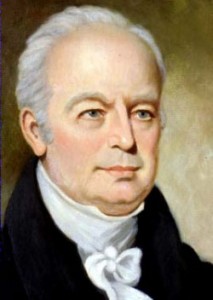
|
| John Rutledge |
The perfectionists at the Constitutional Convention took so much time establishing a careful foundation, that by the time it was necessary to adjourn, several vital matters had to be completed in haste. For example, designing the election of the President was a notorious casualty of careless drafting, and the election of 1800 was to be its near-tragic outcome. It proved necessary to pass the Twelfth Amendment to get things even approximately right. If Rutledge and his committee had not bullied ahead with a long list of tedious details during the July 4, 1787 recess, the hastiness of the Convention's September adjournment might have left many other matters in a similarly impossible jumble. Apparently, Rutledge, a lawyer graduated from the London Inns of Court, had sat by in fuming frustration as one essential matter after another was dumped on his "Committee of Postponed Parts". While the other delegates finally took a much-needed breather at the July 4 recess, Rutledge convened his committee and pushed through a considerable amount of the "boilerplate" which any good lawyer could see was essential, but the dominant soldiers and politicians of the Convention were afraid to decide. As matters turned out, Rutledge had it mostly right, and many of his points were never even voted upon. Unfortunately, when he later tried to do the same thing a second time, he slipped in some egregiously pro-slavery provisions, and the politicians slapped him down. Nevertheless, the proposed Constitution emerged with only a forgivable number of errors, an adequate legal system, and a framework on which John Marshall was later able to build a really outstanding judicial system. To some extent, the Delegates appeared to recognize they were covering up for the inadequacies of James Madison. Not much was made of it in public, but after the adoption of most of the Virginia Plan, and the great compromises of Franklin and Dickinson, Madison won very few of the motions he proposed during the last two months of the Convention. Prior to that time, just about everything he proposed had been adopted. He could not have enjoyed the contrast, very much.
Scholars have declared that the fatal flaw of the Articles of Confederation was that they forced the national government to operate through the intervening agency of the states, whereas the Constitution had a direct connection between "We, the people" and the national government. Nowhere was that truer than in the operation of federal taxes directly on the people, but it was just as significantly true of the Federal Courts. In the case of a vast number of other matters, skipping the involvement of state government may create some efficiency, but that gain is insignificant compared with the loss of sensitivity to local variations. There are indeed times when a national navy or patent system does things which individuals could not possibly do for themselves, but a vastly greater number of other times when personal choice and personal responsibility lead to a better result. It is indeed more efficient in the vast middle ground, to skip the overhead of deciding what is generally best for the whole country, and what to do about countless exceptions. In the case of the federal courts, however, the issues have been pre-selected and enumerated as too broad to leave to state variation. Therefore disputes about them are selectively worth more time and effort to find the right resolution. Seemingly unrelated matters all begin to fall together, which is often a sure sign of using the right approach. Generally speaking, however, there was nothing particularly clever or innovative about Rutledge's work on the Judicial parts of the Constitution. He just got it done.
.......................................Marshall
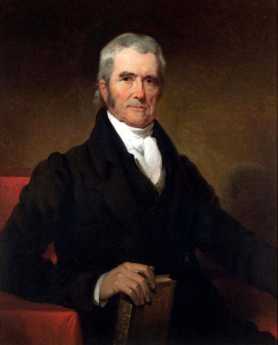
|
| John Marshall |
Marshall had one advantage over Franklin -- youth. Seeing what was needed, and the first three Chief Justices had failed to supply, he accepted John Adams' appointment to be Chief Justice immediately. He then devoted his remarkable legal mind to a whole lifetime of strengthening the role of the Supreme Court as the Federalists had intended, and as the Jeffersonian party had attacked. Marshall promptly found ways to confer on the Court the ability to review and prevent unconstitutional behavior by the Presidents and Congress, the other two co-equal branches of the national government. But his main task, never completely successful, was to devise hammerlocks for those intransigent state legislatures. Marshall quickly acquired enemies who were allied with the legislatures, especially Presidents Jefferson, Madison (!) and Jackson, who would all gladly have cut his political throat.
Although Marshall always seemed to win his battles, he did have to exercise caution in the face of Andrew Jackson's ruthless willingness to fight dirty. In his own view, he probably would be said to have lost the whole war, if his life's goals could be stated as trying to prevent the country from disintegrating into a civil war by learning to play by fair rules. Lincoln gets credit for saving "The Union" (that is, national government under the 1787 Constitution), but at a price of 600,000 casualties. Only if you add a further century to the review, can Marshall (and the 1787 Constitution) be viewed as a success.
Leadership and Priesthood
The Divine Right of Kings is not of much use anymore, even to kings. Nevertheless, it reflects a need to define the final authority, the final word, and therefore creeps into the legal system in various ways, even within a pure democracy. Aside from these traces in the most fundamental of laws, a democracy defines the ultimate leader by the slogan, "The Buck stops here." Late at night, pondering his decisions alone, the highest ruler of the State is apt to feel that all his responsibilities are burdens without compensating divine rights. That's not entirely true. He may use his discretion to bend or break the law in the public interest. But if it fails, he may never get a second chance.
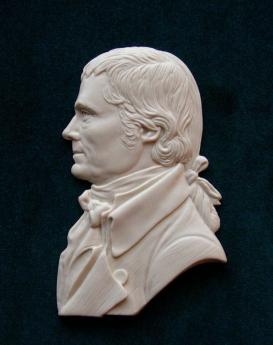
|
| John Marshall |
Start with the example of Euclidian Geometry, where each step is a tightly proven consequence of other steps until you get 'way back to basic fundamentals, called axioms. Axioms are assumptions which have to be made without any proof. The axioms are probably true, but they have to be taken on faith, with the frank acknowledgment that if the axioms are changed, everything dependent on them must also change. The ancient philosophers mostly fell back on God to be the source of axioms, but in modern times it is more customary to rely on "Nature" as the source. During the Eighteenth century Enlightenment period, the "deists" fell back on "Nature's Creator" as a way of saying God without exactly saying it. The deists thus were able to say they believed in God, but only to the extent that He wound up the clock which now runs by itself. If you frankly haven't any idea where these axioms came from, you attribute them to one or the other of these concepts and go on with practical business. Just to take no chances on leaving a gap, a populace which universally believed in God was told that the King was the sole confidante, the sole agent, of God. As things evolved, the King had a divine right which extended to political matters, and the Priesthood was the local authority about matters of morals and spiritual consequence. As priesthood declined in popularity among protestants, Judges assumed the role of deciding "difficult questions", sometimes delegating the role to juries. Kings when they are little princes often get the idea that they are entitled to be capricious, otherwise what good is it to be King? This attitude is sometimes not discouraged when it relates to castles and fancy cars, maybe even to girlfriends. But if it is carried too far there is a danger that arbitrary capricious decisions may seem like a habit, carried over to issues the population has reserved to decide in other ways. When the king does it anyway, he is called an absolute monarch, not always a term of praise, and sometimes the first stage of incipient revolt. Nevertheless, there are inescapably some decisions which must be made, right or wrong, and somebody must make them and take the consequences.
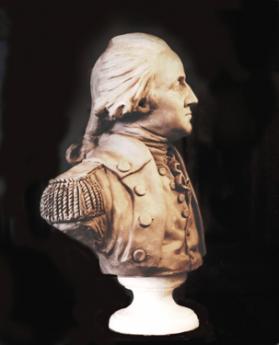
|
| George Washington |
When American Independence was declared, but much more when the Constitution was ratified, it was the first time the former colonists were confronted with living in a system where every citizen was considered equal and sovereign, and nobody else was a contender. A representative Republic provided the practical means for collective expression, and for forty or fifty years the public nursed their fantasy of Every Man a King. Politicians were however soon nibbling at the margins, and the practicalities of running the country did require certain practical concessions. The unexpected growth of the population, from one representative for 30,000 inhabitants to the present 600,000 inhabitants confronted America with a choice it never seemed to accept: a Congressman with 600,000 constituents can never remain in touch with their wishes. But a Congress with 6000 debaters cannot function, either. We have outgrown the original model, but have been unable to devise a satisfactory modification. The sovereignty of the people under such circumstances is much more limited, and the need for arbitrary decisions by the elected monarchs increases. All that remains of control rests in the periodic elections. And the realities of those elections are grim. Political parties dominate the nomination step. Gerrymandering concentrates domination of proportional representation into "safe seats" which permit party control of a majority of the representatives. Incumbency, instead of simply augmenting experience, leads to the electoral power of "name recognition" which all too often is recognition of the name of some relative of the actual candidate. The cost of campaigning among such large population groups greatly magnifies its concentration in parties or interest groups. And the social distance between voter and candidate reaches the point where voters are more easily deceived, by a mountebank. The talent of getting elected has decreasing relation to the talent of governing. Something will be done about these problems, but not necessarily very soon, or very adequately.
So we are reverting back toward sovereignty remote from the people, slowly and only partially we hope. Some of the features of remote sovereignty persist for that reason. We are forced to concede the decisions about atom bombs to the President, about the assassination of terrorists to the security agencies, the currency to the Chairman of the Federal Reserve, and the containment of epidemics to the CDC in Georgia. We delegate such authority to hierarchy in millions of daily ways. A guard was asked whether he would shoot a fellow citizen who was protesting something. His grim answer was, "I will shoot anyone the Sergeant tells me to shoot." It isn't a completely satisfying situation, but it is a variation of what John Marshall called "due process of law". We attempt to limit local discretion by organizing rules for every contingency which would require individual discretion, thus minimizing the chance of a capricious decision. The paradox is that most of this rule by regulation was promoted by the political party of Thomas Jefferson, who was our first experiment in making an instinctive anarchist into our leader. The responsibilities of office made Jefferson retreat in many ways, but it was his cousin John Marshall who knew him intimately and applied the brakes. Marshall, Ellsworth, and Story shared a vision of what the legal system could be, helped ease it into that posture, and then laid out a system of behavior which was at its root, "Honesty is the best policy", the theme of George Washington's Second Inaugural address. Marshall was an absolute ruler of the legal profession and was not above bending its rules to his design. He thought he knew what the Constitution was meant to be, and was determined to make the Judiciary enforce it. What was most distinctive was his insinuation of those principles into daily life, the culture of the nation. After the last vestige of the Federalist political party had disappeared, he intentionally made the American culture a Federalist culture, while seemingly confining his writ to the Federal Judiciary.
Marshall's Predecessor, Oliver Ellsworth
 Judiciary Act of 1789. Sec. 25. That a final judgment or decree in any suit, in the highest court of law or equity of a State in which a decision in the suit could be had, where is drawn in question the validity of a treaty or statute of, or an authority exercised under, the United States, and the decision is against their validity; or where is drawn in question the validity of a statute of, or an authority exercised under, any State, on the ground of their being repugnant to the constitution, treaties, or laws of the United States, and the decision is in favor of such their validity, or where is drawn in question the construction of any clause of the constitution, or of a treaty, or statute of, or commission held under, the United States, and the decision is against the title, right, privilege, or exemption, specially set up or claimed by either party, under such clause of the said Constitution, treaty, statute, or commission, may be re-examined, and reversed or affirmed in the Supreme Court of the United States upon a writ of error, the citation being signed by the chief justice, or judge or chancellor of the court rendering or passing the judgment or decree complained of, or by a justice of the Supreme Court of the United States, in the same manner and under the same regulations, and the writ shall have the same effect as if the judgment or decree complained of had been rendered or passed in a circuit court, and the proceedings upon the reversal shall also be the same, except that the Supreme Court, instead of remanding the cause for a final decision as before provided, may, at their discretion, if the cause shall have been once remanded before, proceed to a final decision of the same, and award execution. But no other error shall be assigned or regarded as a ground of reversal in any such case as aforesaid, than such as appears on the face of the record, and immediately respects the before-mentioned questions of validity or construction of the said constitution, treaties, statutes, commissions, or authorities in dispute. 
|
| Section 25 (In Full) |
Oliver Ellsworth was a scion of several old Connecticut families, had nine children who were not only distinguished themselves, but whose descendants were similarly gifted, rich, and important members of New England society. The Ellsworth give every sign of possessing a very good gene pool. Unfortunately, Oliver's last years were agonized by some disease which gave him constant and sometimes excruciating pain making him terse and abrupt; eventually, he had to resign as Chief Justice after an unbearable recrudescence of his disease. His career almost reads as if he designed it to prepare the Chief Justice's role for his own enjoyment, but instead had to turn it over to John Marshall to enjoy. Associate Justice Joseph Story's career, in turn, reads as though he had been groomed to evangelize Ellsworth and Marshall's Constitutional achievements. Without Story's prolific writing all this Judicial revolution would merely have taken second place in public attention, competing with convulsive political battles, the shooting of Hamilton by Burr, wars and near-wars with European powers, dramatic increases in the population and land mass of the United States, a populace delirious with notions of its own sovereignty, and The Industrial Revolution. Publicity might not have been necessary in a calm, peaceful world, one with time and communication systems allowing public notice of what was happening.
Oliver Ellsworth had been a member of the Continental Congress, was an ardent rebel against British rule, had a flourishing law practice in Windsor, Connecticut, and later in George Washington's presidency was a leader in promoting Hamilton's economic and banking upheaval. He was, so to speak, Mr. Federalist. During the First Congress, he quickly invented and exercised the role we now would describe as Senate majority leader. Like others who had participated in the political science seminar we now call the Constitutional Convention, he had already formed his political beliefs, and when Congress finally opened, he hit the ground running. To understand Ellsworth however, is to understand his deeply-held preference for secrecy, which his opponents characterized as deviousness. He much preferred private negotiations to persuasive oratory, and for five years was able to prevent the Senate from having either minutes or visitors. In this instance, he began his negotiations about the Judiciary Act with James Madison, ostensibly about the Bill of Rights, which was the main activity in the House of Representatives at the moment. No wonder Senator Maclay of Pennsylvania said of Ellsworth, "He will absolutely say anything, nor can I believe he has a particle of principle in his composition," and "I can in truth pronounce him one of the most uncandid men I ever knew possessing such abilities."
On four occasions during the Constitutional Convention, Madison had proposed and been defeated on motions to create Congressional Review of State Laws, that is, the ability of Congress to declare State Laws unconstitutional. Ellsworth, fearing it would jeopardize state ratification of the new constitution, opposed and helped defeat the motions. Now, things were different, and Ellsworth negotiated Senate agreement to much the same idea, provided it could be changed to Judicial Review, and also provided the House of Representatives would agree to pass the Judiciary Act currently under development in the Senate. The deal was made, and both bills were duly passed. Whether Madison or anyone else understood what was in the Judiciary Act, is now unclear. Accordingly, the two-sentence Section 25 of the Judiciary Act of 1789 is appended for individual reader appraisal. In essence, it says the U.S. Supreme Court may hold unconstitutional a decision of a state supreme court to reject an appeal from an unconstitutional act. That is, the 25th section of a bill to organize and coordinate the Federal and State Court systems contained a mysteriously written, two sentence, a transformation of Congressional Review into Judicial Review. From this point onward, the U.S. Supreme Court was empowered -- by Congress -- to declare state laws unconstitutional. Wrapped in the same bicameral deal was an implicit subtle shift in emphasis of the Bill of Rights from protecting the States from the federal government, to one of protecting the people from any and all government over-reaching. It was a noble achievement, facilitated by some questionable maneuvers by the umpires to help it along.
Delaware's Court of Chancery
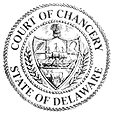 |
| Chancery |
Georgetown, Delaware is a pretty small town, but it's the county seat so it has a courthouse on the town square, with little roads running off in several directions. The courthouse is surprisingly large and imposing, even more, surprising when you wander through cornfields for miles before you suddenly come upon it. The county seat of most counties has a few stores and amenities, but on one occasion I hunted for a barbershop and couldn't find one in Georgetown. This little town square is just about the last place you would expect to run into Sidney Pottier and all the top executives of Walt Disney. But they were there, all right, because this was where the Delaware Court of Chancery meets; the high and mighty of Hollywood's most exalted firm were having a public squabble.
Only a few states still have a court of Chancery, but little Delaware still has a lot of features resembling the original thirteen colonies in colonial times. The state abolished the whipping post only a few decades ago, but they still have a chancellor. The Chancellor is the state's highest legal officer, and four other judges now need to share his workload, which was almost completely within his sole discretion seventy-five years ago. In fact, the Chancellor usually heard arguments in his own chambers, later writing out his decisions in longhand. The Court of Chancery does not use juries.
Going back to Roman times, the Chancellor was the highest office under the Emperor, and in England, the Lord Chancellor is still the head of the bar in a meaningful way. Sir Francis Bacon was the most distinguished British Chancellor and gave the present shape to a great deal of the present legal system. A court of Chancery is concerned with the legal concept of equity, which is a sense of fairness concerning undeniable problems which do not exactly fit any particular law. The Chancellor is the "Keeper of the King's conscience" concerning obvious wrongs that have no readily obvious remedy. You better be pretty careful who gets appointed to a position like that, with no rules to follow, no supervisor, no jury, dealing with mysterious issues that have no acknowledged solution.
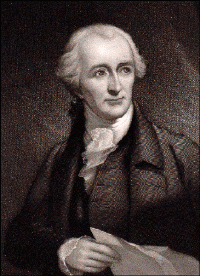 |
| George Read |
Delaware's Court of Chancery evolved in steps, with several changes of the state Constitution over a span of two hundred years. As you might guess, a few powerful chancellors shaped the evolution of the job. Going way back to 1792, Delaware changed its Supreme Court from the design of its Constitution, and George Read was the new Chief Justice. However, it was all a little embarrassing for William Killen, who had been the Chief Justice, getting a little old. Read refused to have Killen dumped, and in this he was joined by John Dickinson, who had been Killen's law clerk. So Killen was made Chancellor, and a court of Chancery was invented to keep him busy.
Under a new 1831 Constitution, the formation of corporations required individual enabling acts by the Legislature and limited their existence to twenty years. However, the 1897 Constitution relaxed those requirements and permitted entities to incorporate under a general corporation law and allowed them to be perpetual. By this time, other states were distributing equity cases to the county level, but Delaware was too small to justify more than a single state-wide Court. That court was attractive to corporations because it could become specialized in corporate matters, but retained a pleasing number of equity cases among common citizens, thus retaining a folksy point of view. In unique situations or those without a significant history of public debate, it was thought especially desirable to strive for unchallenged acceptance of the court's decision.
But other states thought they could see what Delaware was up to. In 1899 the American Law Review contained the view that states were having a race to the bottom, and Delaware was "a little community of truck farmers and clam-diggers . . . determined to get her little, tiny, sweet, round baby hand into the grab-bag of sweet things before it is too late." However, that may be, corporations stampeded to incorporate in the State of Delaware, and the equity of their affairs was decided by the Chancellor of that state. In one seventeen year period of time, the U.S. Supreme Court reversed the decision of the Chancellor only once.
 Chancery's jurisdiction was complementary to that of the courts of common law. It sought to do justice in cases for which there was no adequate remedy at common law.  |
| A. H. Manchester Modern Legal History of England and Wales, 1750-1950 (1980) |
Some legal scholar will have to tell us if it is so, but the direction and moral tone of America's largest industries has apparently been shaped by a small fraternity or perhaps priesthood of tightly related legal families, grimly devoted to their lonely task in rural isolation. The great mover and shaker of the Chancery was Josiah O. Wolcott (1921-1938), the son and father of a three-generation family domination of the court. Most of the other members of the court have very familiar Delaware names, although that is admittedly a common situation in Delaware, especially south of the canal. The peninsula has always been fairly isolated; there are people still alive who can remember when the first highway was built, opening up the region to outsiders. Read the following Chancelleries quotation for a sense of the underlying attitude:
"The majority thus have the power in their hands to impose their will upon the minority in a matter of very vital concern to them. That the source of this power is found in a statute, supplies no reason for clothing it with a superior sanctity, or vesting it with the attributes of tyranny. When the power is sought to be used, therefore, it is competent for anyone who conceives himself aggrieved thereby to invoke the processes of a court of equity for protection against its oppressive exercise. When examined by such a court, if it should appear that the power is used in such a way that it violates any of those fundamental principles which it is the special province of equity to assert and protect, its restraining processes will unhesitatingly issue."
That is a very reassuring viewpoint only when it issues from a person of totally unquestioned integrity, a member of a family that has lived and died in the service of the highest principles of equity and fairness. But to recent graduates of business administration courses in far-off urban centers of greed and striving, it surely sounds quaint and sappy. And many of that sort have found themselves pleading in Georgetown. Just let one of them a bribe, muscle, or sneak into the Chancellor's chair someday, and the country is in peril.
Chief Justice John Marshall Enters (Kettledrums and Crashing Cymbals)
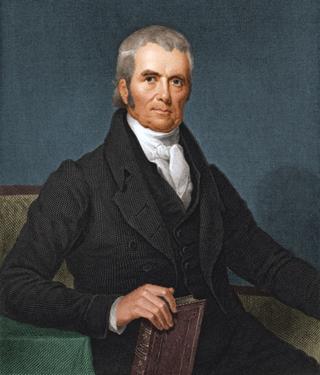
|
| Chief Justice John Marshall |
Chief Justice John Marshall first took his seat at the opening of the new term, in Washington the new capital, on Wednesday, February 4, 1801. It was also at the end of Philadelphia's twenty-five-year reign as the center of the country, and twelve-year Federalist domination of national power, except for the Supreme Court. The Presidency, both houses of Congress, and the federal bureaucracy were in the hands of Jefferson's party. Only the dwindling life tenure of federal judges permitted some power to remain in the hands of Federalists for several more decades. John Adams the defeated Federalist President realized this very well and hastened to fill any remaining vacancies before he left the office. The Jeffersonian Republicans understood what was happening, resented it, and referred bitterly to the "Midnight Judges". We discuss the Marshall Court in some detail because it leads to the Andrew Jackson escapade in high finance, which ultimately merges with evolving financial history back in Philadelphia at the crashing termination of "Biddle's Bank".
Marshall was himself a Midnight Judge in the sense he was the retiring (Federalist) Secretary of State, immediately appointed by Adams to the duties of Chief Justice. He was himself the office of the Adams Administration who neglected to deliver the certificate of appointment of Justice of the Peace to Marbury, who promptly sued James Madison the incoming Secretary of State, to give him his signed and ratified certificate. Jefferson the incoming President of the United States, ordered Madison not to give it to Marbury. The behavior of all these high officials was unbecomingly petty since it was within the power of several of them to end the tangle in simple ways. To make matters still more infuriating, Jefferson delivered a beautiful, heart-warming First Inaugural Speech, full of forgiveness and invitation to compromise ("We are all Republicans, we are all Federalists"), which his own intransigence before, during and afterward transformed into a Federalist by-word for hypocrisy exceeding anything in Shakespeare. It's hard to say whether it makes these performances more or less bearable to learn that Marshall and Jefferson were first cousins. In any event, Marbury v. Madison was the first example of a Supreme Court ruling that a law was unconstitutional. The legal point on which this titanic Constitutional point rested, however, seems mostly a minor procedural error, leaving poor Marbury's problem as a footnote, Marshall's negligence uncriticised, Jefferson's interference unimpeached, and the whole nation's opinion of its governance sadly disappointed. On vivid display was the dominance of petty private grievances of our most venerated Founding Fathers, in an era when a public policy seemed most in need of getting the highest priority. In 1800, the confluence of names alone suggested crisis: Aaron Burr, Robespierre, Bonaparte, Hamilton. It was certainly a dramatic way for John Marshall to make an entrance on the public stage, but compared with the tie-vote election of 1800, and the Trial of Aaron Burr the Vice President for treason, it scarcely seemed worth public notice.
Within legal circles, professional achievements of Judges are ranked by a different standard which seems obscure to both the public and historians. Oliver Ellsworth, Marshall's immediate predecessor, nowadays seems most highly esteemed in the legal profession for revising the nature of judicial opinions. Prior to Ellsworth, the seven justices gave their opinions individually and serially. Ellsworth simplified this to majority and minority opinions of the entire court, with individual concurring opinions if insisted upon. The Chief Justice selects who will write the majority opinion, and generally writes it himself if he is in that majority. Effectively this makes the Chief Justice the voice of the court in important cases. Ellsworth retired for reasons of health before he got many advantages from this change, so the full force of Chief Justice power began to appear with the voice of Marshall. John Marshall then added his own twist, which was the obiter dictum .
Judges often make little speeches from the bench, which sometimes are on the public record. If they are directly related to the decision or opinion, they have some force as precedents to lower or later courts. In other circumstances obiter dicta have little consequence, but Marshall recognized there was a very big difference when an obiter issued from the pen of the Chief Justice of the United States, speaking for a majority of the Supreme Court. All Judges of every Federal Court and the Judges of State Courts in many situations are then on notice that the obiter is the opinion of that court to which all appeals could ultimately be made. It would be a brave judge who ignored this warning, and only a foolish lawyer would bring a case which flouted it. John Marshall had found a way to legislate what was effectively the Law of the Land, one without the possibility of a veto while he was still on the bench. He had not been made an Emperor, because the power of his dicta would depend on how combative he and fellow justices chose to be about it. But, looking ahead, Andrew Jackson would have been showing a profound lack of subtlety about the way things really are, had he issued his famous jibe that "John Marshall has made his decision. Now let him enforce it." Jackson's most distinguished biographer Robert Remini maintains Jackson never said it, and prudently so.
Marshall was also prudent when he had to be, and acting as a Moses was careful to confine his Commandments to his mandate, which was the American law. Some of his obiter dicta might have been ignored as coming from the most powerful Federalist of his day, a former chief of the Virginia Federalist party, but with the passage of time several of these opinions have passed from statements of early Nineteenth century judicial policy into becoming the accepted American view of things. It is reasonably safe to say the following three dicta anticipate the coming of the Civil War, define its issues, and survived that war, reconfirmed:
The Federalist View of the Constitution. The Constitution is an ordinance of the people of the United States, and not a compact of States.
Enumerated powers. While the government which the Constitution established is one of the enumerated powers, as to those powers it is a sovereign government, both in its choice of the means by which to exercise its powers and in its supremacy over all colliding and antagonistic powers.
States Rights. The National Government and its instrumentalities are present within the States, not by the tolerance of the States, but by the supreme authority of the people of the United States.
 Article 1, section 10, clause 1 No State shall enter into any Treaty, Alliance, or Confederation; grant Letters of Marque and Reprisal; coin Money; emit Bills of Credit; make any Thing but gold and silver Coin a Tender in Payment of Debts; pass any Bill of Attainder, ex post facto Law, or Law impairing the Obligation of Contracts, or grant any Title of Nobility. 
|
| The Contract Clause |
The Sanctity of Contracts. In a famous dialogue between James Madison and Roger Sherman of Connecticut, Madison identified the erratic and high-handed behavior of state legislatures as one of the main reasons to convene the Constitutional Convention. He was describing a long list of behaviors which included reclaiming sales which had been regarded as permanent, reversing statutes, interfering with executions or other verdicts of courts, intervening in private controversies, calling for new hearings, introducing new rules of evidence after a trial had begun, and so forth. To a considerable degree, these abuses grew out of a collision between the undeniable right of a later legislature to change the rules which had been established by an earlier legislature, balanced against the disruptive effect of making any changes in rules, no matter how beneficial. For their part, the courts were in need of restraining themselves with doctrines like stare decisis , while reserving the right to make desirable changes in the law after serious consideration. They were also in need of establishing best practices and insisting they be followed, eventually evolving into the concept of due process , which eventually became Constitutional doctrine by the XIV Amendment. The legislative equivalent of these judicial principles was seen in laws passed after the crime had been committed ( ex post facto ), special legislation for one case an exception to general rules, and a wide variety of other unfair practices which had grown up. Accordingly, Article 1, section 10, clause 1 of the Constitution was written but often evaded in practice by sly legal tricks with Latin names. Examples of the broad principles might be stated in the constitution, but it required an experienced Judge to recognize the many evasions for what they were and organize a set of rules to implement the Constitutional principle. Marshall appointed himself in that role and systematically integrated his judicial counter-attack into a coherent code of moral conduct, bit by bit in obiter dicta.
We should let the French traveling correspondent, Alexis de Tocqueville, pass the final judgment on Marshall's effort:
"Scarcely any political question arises in the United States which is not resolved sooner, or later, into a judicial question. Hence all parties are obliged to borrow in their daily controversies the ideas, and even the language peculiar to judicial proceedings. . . The language of the law thus becomes, in some measure, a vulgar tongue; the spirit of law, which is produced in the schools and courts of justice, gradually penetrates beyond their walls into the bosom of society, where it descends to the lowest classes, so that at last the whole people contract the habits and the tastes of the judicial magistrate."
Evolving Constitution
Constitutional Judicial Branch Clauses
 Article III - The Judicial Branch Section 1 - Judicial powers The judicial Power of the United States shall be vested in one Supreme Court, and in such inferior Courts as the Congress may from time to time ordain and establish. The Judges, both of the supreme and inferior Courts, shall hold their Offices during good Behavior, and shall, at stated Times, receive for their Services a Compensation which shall not be diminished during their Continuance in Office. Section 2 - Trial by Jury, Original Jurisdiction, Jury Trials The judicial Power shall extend to all Cases, in Law and Equity, arising under this Constitution, the Laws of the United States and Treaties made, or which shall be made, under their Authority; to all Cases affecting Ambassadors, other public Ministers and Consuls; to all Cases of admiralty and maritime Jurisdiction; to Controversies to which the United States shall be a Party; to Controversies between two or more States; between a State and Citizens of another State; between Citizens of different States; between Citizens of the same State claiming Lands under Grants of different States, and between a State, or the Citizens thereof, and foreign States, Citizens or Subjects. In all Cases affecting Ambassadors, other public Ministers and Consuls, and those in which a State shall be Party, the Supreme Court shall have original Jurisdiction. In all the other Cases before mentioned, the Supreme Court shall have appellate Jurisdiction, both as to Law and Fact, with such Exceptions, and under such Regulations as the Congress shall make. The Trial of all Crimes, except in Cases of Impeachment, shall be by Jury; and such Trial shall be held in the State where the said Crimes shall have been committed; but when not committed within any State, the Trial shall be at such Place or Places as the Congress may by Law have directed. Section 3 - Treason Treason against the United States shall consist only in levying War against them, or in adhering to their Enemies, giving them Aid and Comfort. No Person shall be convicted of Treason unless on the Testimony of two Witnesses to the same overt Act, or on Confession in open Court. The Congress shall have the power to declare the Punishment of Treason, but no Attainder of Treason shall work Corruption of Blood, or Forfeiture except during the Life of the Person attainted. 
|
| Constitutional Powers of Judicial Branch |
Reconsidering All Our Laws
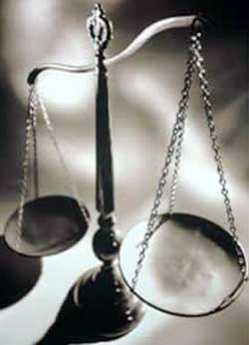
|
| Common Law |
A KING who conquers a new country theoretically gains the chance to revise all its laws. However, thousands of years of experience demonstrate that those who are good at wielding the sword seldom have much interest in, or aptitude for, devising a legal code. Napoleon seems to have been an exception, and Alexander the Great was tutored by Aristotle, but most conquerers have been illiterate in the law. Therefore, earlier conquerors merely extended their native laws into additional territory or else left the whole business to a permanent priesthood of judges. In this way, an independent judiciary could survive unless, like Thomas a Becket or Thomas More, it grew stubborn about thwarting the wishes of the King. The concept of citizen rights more or less defined feasible limits to what the King was allowed to do. British law went still further, distinguishing between rights of the people and rights of the sovereign. It identified those few things even a King was not allowed to do, as well as those many things he alone must be able to do in order to govern. The latter were collectively called the King's Prerogative. Today, we would call it a job description.
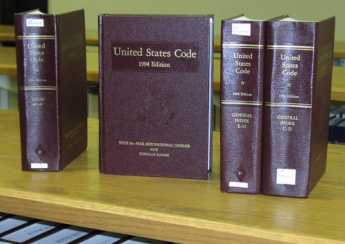
|
| U.S. Codes |
Along those lines, the English Civil War had been fought, briefly transferring the power of Prerogative to Parliament, and incidentally clarifying some disadvantages of doing so. Americans, after fighting an eight-year Revolutionary War to be rid of a particular king, had developed a sentiment for eliminating all kings entirely. However, the memory of the English Civil War and subsequent abuses by the Cromwell Parliament restrained that impulse. The alternative idea grew of transferring sovereignty to the people, to be translated into action by their elected representatives in the Legislative branch. Although such sovereignty would be unlimited, the intermediate steps taken by the Legislature could be deliberately slowed down, and particularly worrisome actions might be tangled up in complicated steps of legal process by a vocal minority. Such a complicated system required an umpire, which Chief Justice John Marshall eventually positioned the Supreme Court to be. Conducting elections every two years was a simple way to allow the people to restrain its agents from the misbehavior of a more general sort. Since George Washington was confidently expected to be the first President, it was left to him to devise protections against presidential abuse, since he had notoriously and repeatedly expressed his intense dislike of kings. In modern times this system of checks and balances has only been severely tested once, in 1937. Immediately after winning a landslide re-election in 1936, Franklin Roosevelt nevertheless was slapped down hard by public outcry forcing Congress to thwart his Supreme Court-packing scheme.
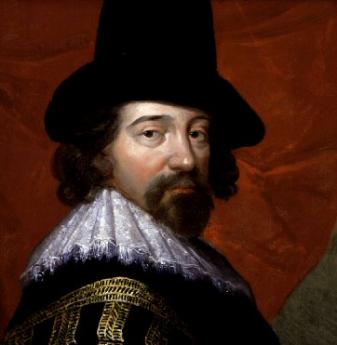
|
| Sir Francis Bacon |
Such subtle, complicated ideas cannot be implemented by writing 6000 words on a piece of paper, and they certainly cannot withstand two hundred fifty years of subsequent nit-picking by dissenters, no matter how carefully crafted the 6000 words may have been. The complexity of the political system it describes would long ago have fallen apart without a million little accommodations and revisions, just as every other nation's constitution has done during that same period of time. And that fine-tuning process was made possible by starting with a more or less blank slate, with thousands of lawyers and legislators debating every particle of common law for more than a century. In 1787 it was decided to adopt English common law as a default position, and to invite a host of legislative bodies to debate and replace any part of it with a "statute". It was a laborious process. Measured by pages of law books, the volume of statutes only grew to equal the volume of common law by the time of the Civil War. The English common law was certainly a good place to start, having been created by Sir Francis Bacon two hundred years earlier as the legal equivalent of the Scientific Method; based on real, adversarial contested case decisions, a hypothesis was created, then tested, revised, and tested again. By actual count, one state legislature only enacted three statutes in the year before the Constitution was ratified; all its other activity was concerned with adjudicating disputes within the boundaries of the existing common law. But when the Constitution suddenly rearranged the balances of power in 1787, almost every sentence of common law had to be regarded as potentially requiring modification to reflect the new Constitutional rearrangements. During the first half century there existed great enthusiasm for almost all of the new Constitution except those parts which affected slavery, the fine-tuning was almost universally intended to strengthen it or repair some oversight. If it failed in some way, adversaries were quick to point out the flaws. In short, every lawyer in the nation was involved to some degree for a century in the process of re-writing the English common law for American purposes, in American circumstances, for the grander purpose of strengthening the American commonwealth.
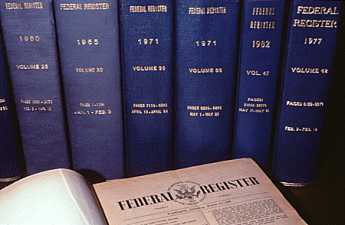
|
| Federal Registry |
And everyone knows what happened next. The state legislatures who considered it normal to pass fewer than a dozen laws in a year started passing fifteen hundred in a year and kept it up for many years. Today, almost every state legislature considers more than a thousand bills and passes two or three hundred. Since the colonial legislatures passed few laws and spent most of its time adjudicating disputes about existing law, the character of the law changed as it gradually gave up adjudicating, stopped being like a court. The tendency of early law was to state principles to guide the judges. In recent times, our over-lawyered system specifies all imaginable conditions and exceptions in excruciating detail, so that our laws tend less and less to speak of "reasonable amounts" and more and more to define drunken driving, for example, in milligrams per deciliter of the defendant's blood. We have better measuring devices, so we measure. But who can deny that a legislature accustomed to making judgments itself, will more confidently rely upon the good judgment of courts, than a legislature which spends its time going to committee meetings to consider the testimony of experts, often never visiting a courtroom?
Our lawyers, who once enlisted the efforts of the entire profession for a century into refining the English common law into the American statutory law, are to be encouraged to extend equal effort into the process of turning off the faucet. Or possibly, having done such a good job at this assignment, seek another line of work?
Owen Roberts: A Switch in Time
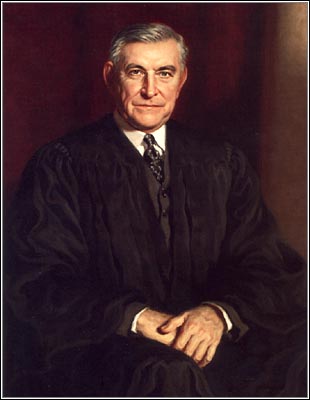
|
| Owen Roberts |
To this day, no one knows quite what to make of Owen J. Roberts, founder of one of Philadelphia's largest law firms. He was Prosecutor of the Teapot Dome scandal, Dean of the University of Pennsylvania Law School, Republican appointee to the U.S. Supreme Court. But then, he abruptly became the source of one of the most radical revisions of our system of government since the Declaration of Independence. Nothing in his prior career and nothing afterward in his subsequent civic-minded retirement from the Court seemed to suggest any radical turn of character had taken place. He has been compared with a famous baseball pitcher who threw right-handed or left-handed at will, unexpectedly, capriciously, who knows why.
The issue went far beyond one clause in the Constitution, but the commerce clause was the focus point. Under the limited and enumerated powers allowed to Congress by the Constitution was :
The Congress shall have power to regulate commerce with foreign nations, and among the several states, and with the Indian tribes.
That used to be called the interstate commerce clause until the Supreme Court announced its decision in the case of Wickard v. Filburn. When linked with the Tenth Amendment, granting to the States the power to regulate everything not specifically granted to the Federal government, this clause in the Constitution was universally taken to mean that the States had control of commerce within their borders, while Congress would control interstate commerce. Wickard v. Filburn took all that power from the states and gave it to Congress, which henceforth would regulate commerce. John Marshall had certainly triumphed over the hated state legislatures, but the Supreme Court suddenly lost its power to overrule Congress, too. One side had won the old argument, by silencing the umpire. No wonder Franklin Roosevelt started annual celebrations called Jefferson-Jackson Day dinners.
To describe the background: The 1929 stock market crash was quickly followed by the economic Depression of the 1930s. Nothing of this magnitude had been seen before, and there was a stampede to try new and untested solutions. Even government action which actually worsened economic conditions was felt justified if it conveyed to the frightened public the image that its leaders were taking firm action. Since Socialism and Communism were among the solutions grasped for, many unfortunate actions were felt justified as a way to control the Bolshevik threat. Many of these New Deal actions were declared unconstitutional by the Supreme Court since they involved sweeping revisions in the way all commerce, internal to the States as well as interstate, was conducted.
The Depression and financial panic continued through the 1936 Presidential election, which Roosevelt won in a landslide. Immediately after the start of the new term, he announced a plan to increase the number of Justices on the Supreme Court, appointing new ones more to his liking. He was at pains to point out that seven of the nine life incumbents had been appointed by Republican Presidents. This was, of course, the restraint intended by the Constitutional Convention, and the idea of packing the Court with new appointees was exactly what Jefferson and Jackson had tried to do.
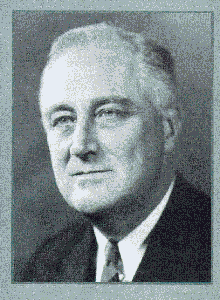
|
| Franklin Roosevelt |
In the meantime, the case of Filburn, a dairy farmer, came up. One of the New Deal agencies had assigned him a quota of 200 bushels of wheat he could grow on the side, as part of an effort to raise wheat prices by reducing supply. Filburn had raised 400 bushels, but consumed the extra wheat for his own personal use, hardly a matter of interstate commerce. The Court had repeatedly declared laws like this to exceed the interstate commerce limitation and were thus unconstitutional for the Congress to enact.
Well, Owen Roberts changed his position, Filburn lost his case. Forever afterward, this change of position was referred to as the switch in time, that saved nine. Since that time, the Court has rarely had the courage to rule any action of Congress unconstitutional, even though it is true that Congress promptly and resoundingly rejected the court-packing proposal.
And furthermore, the power of the state legislatures has shriveled because all commerce (except insurance and real estate) is federally regulated, with a corresponding vast increase in the size of the Federal bureaucracy, as Congress relentlessly pushes to intervene in commerce among the several states, formerly known as the Interstate Commerce Clause. Franklin Roosevelt had a certain right to gloat at Jefferson-Jackson Day dinners.
A few weeks before he died, Owen Roberts had all his papers burned. Apparently, we will never know whether the present outcome was the result he had in mind. Since he was later the author of Alfred Barnes' will, which strenuously sought to prevent the transfer of the Barnes art collection to Philadelphia County, anything written by a lawyer can apparently be reversed by other lawyers. One would have supposed that either the Original Intent would govern, or else the opinion of the Supreme Court on what the Constitution means, would prevail. Franklin Roosevelt showed us there is a third possibility: the President can overrule the Court by intimidating it.
Roberts the Second
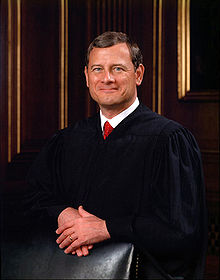
President George W. Bush nominated John Roberts to be Chief Justice of the U.S. Supreme Court in 2005. Since then, the Chief's administrative changes to the court and the whole court system have been slow but methodical. To the extent the Chief Justice has control of the matter, Roberts has been taking steps which make the Court into a more thoughtful branch of the Federal Government, ultimately making it more powerful. His first step was to reduce the number of cases considered each year, constraining them to conflicts between lower jurisdictions, unless otherwise mandated. This year, the number of cases heard is about eighty, or only half of the previous numbers. The policy lets unconflicting Appellate judgments stand. A second court must disagree with the first one, for the Supreme Court to enter the case.
The so-called Obamacare case, (NFIB v. Sebelius), meets this conflict-between-jurisdictions standard, but is notable for other innovations. The case was nationally broadcast as a live slide show. It heard arguments lasting three days instead of the usual single hour, and of course, it broke new substantive ground in a case of national interest. The decisions will now get more press attention; but this relatively rapid evolution toward a national debating contest, through modified Court procedure, is more important than it looks. It would be saying too much to claim the whole nation now fully understands its Constitution of enumerated powers, but surely the citizens who have only recently learned something about it must number in the millions. Before this case, many law school graduates might have had difficulty describing the design of the federalized system in a plausible dinner-table conversation. It's not yet clear where John Roberts is going, but he is surely trying to bring the public along with him.
During the semi-televised arguments, I was at first impressed with the rapid-fire exchanges between Justices and litigators about the operation of health insurance. Some people are born with high-speed brains and high-speed speech apparatus; no doubt, such people are sought after to represent others in court. But after practicing Medicine for sixty years and writing books about health insurance, I recognized that several rapid-fire responses by the attorneys were confident but off-target. Frankly, if you only have a few minutes but many points to make, and have to say them before someone interrupts, you would almost have to be a circus freak to manage. This is quite unnecessary, no matter how entertaining it may be to other lawyers. There seems no reason why the questions cannot be submitted in writing, sometimes employing experts on the specific points, and allowing enough time without interruption to devise a thoughtful answer. At present, it seems to matter more what the litigating attorney will agree to, than what is the fact. The outcome of cutting a litigant off after he says, "Yes, your honor, but.." is now only to establish whether both sides agree on a point; just why they agree or disagree is not even sought, let alone disregarded. It would seem useful to know Justice Thomas' reasons for abstaining from questions during oral arguments, for a different sort of example. So, it is easy to imagine that John Roberts has some thoughtful goals in modifying Supreme Court traditions, and equally understandable if jurists of this distinction become irritated by suggestions from the peanut gallery. It is thus fitting that we all hold back and first watch where the varsity means to take us. But allowing the public to express an opinion, is not the same as lobbying for it.
The Obamacare Act was about 2600 pages long, and two years after the President signed the bill, more than half of the necessary regulations remain to be written. The Law is "not severable", which is to say individual pieces of it cannot be attacked in court, without potentially upsetting decisions made on other portions. As a consequence, both the good and bad parts could endure for a long time to come. Or, the whole thing could suddenly sink from sight, relatively quickly. If the Justices can tolerate it, this legislation with many "moving parts" could be in the courts for a long time to come. So, Justices will then find the rule Roberts has made, of only accepting conflicts between the jurisdictions, protects their time and patience. But in doing so it will shift most final judgments into the hands of the lower, appellate courts. The legal profession will like this quite a lot. It will be like the gratifying situation said to prevail when a commanding General decides to retire -- everybody down the line could get promoted one notch.
By artfully selecting cases to argue, there were here four points open to the decision. Only two of them eventually had bearing on the final outcome of this case, but the whole issue is not necessarily concluded. The first decision got the most attention, deciding that the penalty for not having health insurance could be read as just a tax, and therefore was legal for Congress to use as a Constitutional basis for making health insurance mandatory, as Roberts declared the "Commerce clause" was not. The distinguishing feature of a Congressional exaction which is "just a tax" appears to be whether it exceeds the expenditure intended; if it exceeds the expenditure it would presumably be punitive. Nothing had seemed more important to the Founding Fathers than to expand the ability of the national government to impose taxes to service war debts. To truncate this wish of George Washington and Robert Morris into a short-cut, "Congress has the right to tax", or conversely to expand its confining language into "Congress has the right to tax in order to make private health insurance compulsory" just points up that the only real purpose of taxes in Washington's day was to wage war, and that the purpose of allowable taxes probably would have been defined if other purposes had been foreseen. Someone could usefully point out that what the Constitution really means is that Congress has the right to tax for "defense and the general welfare", and challenge anyone to argue otherwise. One sees the clever hand of Gouverneur Morris fuzzing up that argument; are we to ignore the fungibility of money and ask whether Congress may spend money on the general welfare only if it is general? How about earmarks, for example, are they all for the general welfare?
However, to turn a blind eye toward interesting issues is apparently a price that must be paid for obtaining the right for the Chief Justice to write the majority opinion, which eventually slips in some language (in legal language, an obiter dictum) to the effect that , of course, you couldn't use the Commerce Clause to do that. Getting Justice Ruth Ginsburg to sign that will eventually sound like the box John Marshall constructed in Marbury v. Madison. If that obiter dictum is as heat-resistant as the opinions of the first Justice Roberts in Franklin Roosevelt's court-packing effort, then the Commerce Clause is likely to be off-limits for a long time. Of course, if Chief Justice Roberts had joined the other four conservatives he would still have been able to write the majority opinion, but in the opposite direction. Except of course for that inevitable political accusation: There you go again, you 5-4 conservatives.
The second decision, in this case, is the sleeper. Congressional managers in charge of writing the bill had finally decided they had no way to cover 40 million uninsured people, except by diverting fifteen million of them into what is acknowledged to be the absolutely worst part of the American medical system, the state Medicaid programs. And because many States Rights advocates were in charge of state Governor's offices, the Congressional bill-writers added what is now a fairly familiar prod to cooperation. That is, if a state refuses to take the extra Medicaid patients, it will lose all federal funds for existing clients of state Medicaid. This sort of coercive provision has become so standard in highway bills and other federal programs operating at the state level, that it was largely unnoticed in the 48 hours the Congress was given to examine 2600 pages of legislative provisions. This, however, is blackmail, said John Roberts, quite unallowable under the defined separation of powers of the Constitution, between the state and federal levels of government. Furthermore, if some state decides to accept the penalty, it could close the existing program for the poor and accept the subsidy for the middle class, thus enhancing their revenues and reducing their obligations to the poor. Congress must now devise new strategies for suggesting federal programs to the states, and probably will do so. But the financial blackmail strategy now has a permanent black eye, with a skeptical public eye on the alert for it. The ironic conclusion of all this comes from the Congressional Budget Office, which predicts we will end up with 30 million uninsured persons, anyway.
What's awkward about this was immediately pointed out by attorney Richard Epstein: it ignores the century-old precedent set by Chief Justice Taft. Writing about a Child Labor law, Taft created a Supreme Court precedent that the Constitutional taxing power of the national government may not be used to implement what cannot be implemented directly. We can now see an example within the borders of a single case, where the Constitutional taxing power provision is used to indicate an otherwise impermissible Obamacare, and a few pages later its use is forbidden in the case of Medicaid in order to accomplish a forbidden coercion. Locating the two issues in the same case decision helps make the distinction between using the taxing power for revenue, and using it to coerce obedience; the distinction grows as the magnitude of the tax grows, particularly after it exceeds the intended government expenditure. What is not emphasized is the basis for Chief Justice Roberts reversing the precedent set by Chief Justice Taft on the same topic a century earlier. He did it with the Obiter dictum, and yet he didn't exactly do it. The four liberal Justices who co-signed the decision are not in a position to dispute it, while the four conservative Justices may not wish to. In either direction, however, the vote of the current Chief Justice appears to be both decisive and subtle.
It remains to be seen whether the 'tax, not commerce' strategy was clever. If the tax approach proves to be durable, it presumably extends to a wide range of legislation since Roosevelt's New Deal. Already, its awkward features have emerged in renaming portions of Obamacare into Chapter 48 of Subtitle D of the Internal Revenue Code of 1986 (!). Any law student who tries to look that up is going to have a frustrating time. But on the other hand, sometimes you win by losing. If it should somehow not be a tax, it has already been excluded from the Commerce Clause, so it has no hook left in the Constitution on which to hang it. There's something in this whole wrangle which resembles the position of Germany and Japan after the Second World War. In spite of losing that war, those two nations seem to have prospered better than England and Russia, who lost their empires but are said to have won the war .
Dark Morning at the Supreme Court
Congress recently extended copyright duration to 99 years if owned by a corporation, or the life of the author plus 50 years if the author retained the rights. Widely referred to as the Sonny Bono law, it was assumed to be a favor from Congressman Bono to the Walt Disney Corporation, whose copyright on Mickey Mouse was nearing expiration. Eldred, a publisher of reprints of old books, took this matter through the courts as an action against John Ashcroft, the Attorney General, to prevent his enforcement of a law which, in their view, violated the intent of the Constitution. Thus, the case of Eldred v. Ashcroft came up for oral argument at the U.S. Supreme Court. Since I was interested in reprinting important books about the dim Philadelphia past and discovered it was now usually impossible to determine who had copyright ownership, I went to Washington to hear arguments which might clarify the best approach to take. And perhaps to take the measure of the people on both sides of the argument.
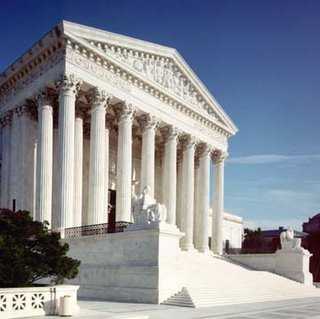
|
| Supreme Court |
fubar So, the Metroliner to Washington and overnight in a hotel. On the advice of people who knew people involved in Supreme Court matters, I set my alarm for 5 AM, arrived at the Court building at 5:30 AM. It was still pitch dark at that hour, and rather cold. Occasional fine showers would describe the weather. When I arrived, there were already 75 people standing in line. Several policemen kept the line in order, and chatted affably with the standees by way of implying that it wasn't their fault. When it's dark and the line is rather impromptu, some people will try to cheat on the queue, especially since many standees didn't know whether it made a difference or what to do if it did. What to do is to shout at the culprits to get back to the end of the line where they belong, which they mostly do after the policeman shambles over. At 9:30 AM, the line started to move forward. The policemen had been counting, too, and came back to about where I was standing. Sorry, sir, this is all that will be allowed in. What to do? Well, you can stand in another line to be formed, for fifteen-minute tourist visits, first-come, first served. As events unfolded, however, a number of people at the very front of the line had been paid to hold a place for someone else and then someone else didn't show up in time to get in as the line surged forward, so there were a few extra seats and I got one. I didn't dare get out of line to count the people behind me, but it was surely several hundred, forced to end up in the fifteen-minute line. The crowd exchanged a lot of grumbles about all this, mostly with a focus on why don't they allow this to be televised. Why not, indeed.
Inhibiting the behavior of the Justices might be one explanation. Some of them sat there silent as a stone, but many of them interrupted at will, and with acidity. Not only are the counsels at a great disadvantage in trying to make nice to people who will decide their case, they are strictly limited to concise presentation, where a interruption breaks the stream of argument. It becomes very clear that the proceedings are not held primarily for marshaling all arguments -- weak and strong -- on both sides, but rather to summarize the strongest, and give the Justices a chance to ask questions. The Justices and their clerks have presumably already read the full arguments which have been printed and handed in. This really isn't a trial. Public comments ("amicus briefs") must be printed and attached to the main briefs at the time the Court agrees to hear the case ("grants a writ of Certiorari")). Since the Court only agrees to hear a hundred cases a year, it "grants cert" less than 2% of the time. A case is supposed to be ripe for decision, all useful arguments having already been voiced, when the cert is granted.
So, under the present understanding of things, it may not be time to put these oral arguments national television. A more important step might be to find an effective way to publish the briefs on the Internet. Even then, the Court will probably squirm at the idea that they must listen to huge media campaigns, orchestrated to convey the implication that the Justices better yield to public opinion wrapped in the spin of the litigants. Since Walt Disney owns one of the three national television networks, that might not be an impossible development.
To get back to this case, it seems a little strange that copyright protection was deemed important enough to be among the few basic principles in the Constitution. Many have expressed the opinion that patents and copyrights must have originated with Ben Franklin, the only real author, and inventor attending the secret Philadelphia meetings of the Constitutional Convention. For what it is worth, the minutes show it was Madison who proposed the idea, Pinckney who seconded it, but Franklin was the world's expert on keeping his fingerprints off ideas. Most of the members of the Convention, farmers thought they were, were also members of the first Congress under the Constitution, when that Congress set the time of copyright at seventeen years. It is a pity they did not say so in 1787. In the eventual 7-2 Eldred v. Ashcroft decision, Justice Ginsburg chose to define the issue at stake as whether Congress had the right to set the duration of patents and copyrights. Of course, that was always beyond real dispute. But whether anybody ought to set it at 99 years, well beyond any author's lifetime, emphasizing the point by adding 50 years to any author's lifetime introduces fundamental questions of wisdom. One by one, every single Justice found a way to observe that this law was not wise. But rather than stirring up controversy with Congress over the fundamental rights of each branch, the Supreme Court seems to have decided to give a public opinion a chance to force Congress to eat its words.
Although the decision in Eldred is a disappointment to me and my private interests, I can live with it as a concession to public tranquility. But I really don't see why an overflow auditorium could not be provided next to the Court, where people who travel on the Metroliner and stand in the dark and cold for five hours, could at least watch a closed-circuit version of the oral arguments.
Regulation Precision: Not Entirely a Good Idea
Addressing the Flaws of Republics
EVERYONE might profit from reading Plato on the subject of republics, not to mention reading James Madison. Both The Republic and The Federalist were conjuring republics they proposed, not ones they had experienced. After Madison did get the hands-on experience he had such radical changes of opinion his friend George Washington essentially never spoke to him again. Not only in republics, of course, does reality prove different from founding theory. It might seem more measured to say of republics that two centuries of their reality proves to be such an extension of theory, it effectively departs from it. In essence, the Republican idea is to limit the voters to one periodic review of their representative's term of office overall, not in ongoing picky detail which would hamper him. This definition contrasts republics with democracies and implies the reason to favor republics. The elected representative is given full power to act during his term in office, but must eventually face the voters for accounting at the fixed time for re-election. Plato and Madison were right about extending latitude to one's chosen representative, but they failed to predict how effectively that latitude might be stolen by the legislative body itself and controlled by rules and leadership which skirt ratification by the general public outside their chamber, in any district. The Romans, of course, did know what they were talking about, but history has tended to ascribe Roman difficulties -- assassinations, for example -- to flaws in Roman character rather than in the construction of the Roman Republic. After describing some problems history has revealed about our own system, this essay is written to propose a solution. A second essay follows, to defend that solution.
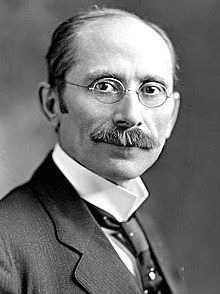
|
| Joseph L Bristow |
The differences between House and Senate in the original U.S. Constitution were three, but since the Seventeenth Amendment in 1913, there are now only two. Originally, Senators were selected by the states they came from, mostly by the legislatures. A century of experience demonstrated the result was cronyism, members of the legislature using senatorial appointments as bargaining chips and for the most part limiting the choice to one of their own members. The provision probably did attract a higher grade of legislator overall, encouraging those primarily ambitious to be U.S. senators to have a try-out in the minor leagues first. It did give the State government serious power to punish a U.S. senator who failed to please the home state. And this selection process made it simpler and cheaper to run for the job as U.S. senator. This feature encouraged candidates with competing for career choices, otherwise discouraged by the expense and unpleasantness of candidacy, to step forward. But by 1913 all this was seen as a way for cronyism to dominate the process, swapping appointments for favors, or even more tangible bribes. From the distance of another century, it can be seen that the steadily declining power of state legislatures was matched by a declining quality of their elected membership, leading to a rising level of sordidness in their foibles. Hapless amateurs were largely supplanted by career politicians. After the Civil War "states rights" stirred up memories of secession and led to a deliberate weakening of the states' role. Whatever the reasoning, the mentality of Progressivism was sweeping the country in 1913, and popular election of senators was deemed a Good Thing, swept into general satisfaction. Doubt about whether it all made as much difference as claimed lies in the reality that from 1913 to 2010, one quarter (182) of all Senators have first arrived in the Senate through appointment by a Governor to fill an unexpired vacancy. Many of these vacancies have of course been contrived for the purpose.
The relative power of a senator and a representative lies in the size of the population who vote for them, and the frequency with which they must endure that unpleasantness. Members of the House are elected for two years and members of the Senate are elected for six; the voting constituency of 100 Senators is generally much larger than that of 532 Representatives, so because the population grows faster than the number of states, the representation discrepancy also grows. The frequency of running for reelection seems to be so irksome that whenever a Senate seat falls vacant, some sitting Congressman from that state is almost certain to try to switch. Of course, it is true that with only a quarter as many senators as congressmen, the power of each vote is weightier. To the extent that committee memberships represent special insider power, a senator does belong to more committees but is more severely stretched to attend them all. Each senator's vote does have a greater scarcity value, but a Representative who tends to business is more likely to know what he is talking about, hence better able to be influential in the committees where most matters are really decided. The limits of merit promotion in both houses of Congress lie in the differing power of various committees, while the favor of appointment remains within the iron control of caucus leadership. In public, senators seem generally more polished and experienced in public persuasion. The persuasion that counts, however, is of gaining the respect of colleagues in your own legislative body, always restrained by the power of leadership to coerce conformity. Public persuasiveness, by contrast, is often little more than glibness, reflecting greater experience with dodging an issue to conceal a lack of depth in it. Almost all senators aspire to the presidency, although few achieve it. No Congressman has been elected President since Warren Harding; indeed, few Congressmen even dare to seek the nomination. The appointment of Gerald Ford was a special situation. However, it is worth pondering that during the early days of the republic, the House of Representatives was considered much more prestigious than the Senate, and that curiosity continues to raise an important question just why it is now reversed.

|
| George Washington |
The differences in prestige between the House and the Senate cannot be ascribed to the comparatively minor differences in their Constitutional definition, the size of their district and the frequency of election. Otherwise, we could immediately improve the quality of congressmen by reducing the limit of their number and frequency of re-election, which scarcely anyone has proposed. The more likely source of the problem can be found in the differing rules of procedure which each body has adopted; and reaffirms at the opening of each term. Various strategies of committee assignment and seniority have adapted to the reality that newly elected politicians rarely have any skills other than the ability to get elected. But almost everyone can learn, given enough time being exposed to a topic. A seniority system can occasionally lead to someone who is hopeless, gradually floating into a position where he can do great harm. Provision must be made for graceful exceptions to the seniority rule, usually by excluding a member from important committees until he has demonstrated some competence, less often by later dropping someone who has age- or alcohol-diminished faculties. Underlying this approach is a contempt bred of experience for the wisdom of the voters, back there in the district, whereas the leaders of the fraternity can protect the nation by judiciously devised rules. Sometimes it is, unfortunately, necessary to be a little hard boiled.
So far so good. When Jefferson and Martin Van Buren invented political parties, the bodies of Congress responded by inventing caucuses. George Washington was not a learned man, but he knew he hated this system. James Madison probably feared political parties more than he hated them, so he incurred Washington's permanent displeasure by getting good at manipulating what he saw as the winning strategy. Van Buren's fate was more ironic; after inventing many of the unpleasant little strategies of modern politics, he was defeated by William Henry Harrison in the "log cabin" election of 1840. Harrison hadn't been born in a log cabin at all, he was born in a Virginia mansion, hee, hee, hee. George Washington wouldn't have chuckled at that one, he would have been livid.
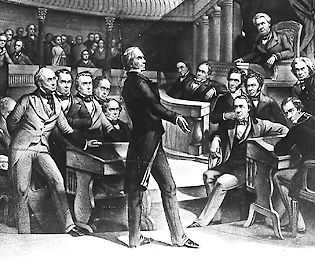
|
| Henry Clay |
Party caucuses have only one central feature, which is vote-swapping. Many of the strategies of this unattractive behavior were outlined in elegant detail by Pliny the Younger, in the Roman Senate, and James Madison the student of government had sought to avoid them. When he decided it was hopeless, he joined them and got good at it. In retrospect, the premier example of vote-swapping was the trade which Madison and Hamilton made, placing the nation's capital in Virginia/Maryland instead of Philadelphia, in return for federally redeeming the Revolutionary debts for all 13 states, when Virginians had already paid theirs off. Philadelphia had essentially nothing to say about it. Pliny had cautioned and subsequent practitioners have followed the advice to cover your tracks by swapping votes for an issue seemingly unrelated to the one in dispute. That's about all there is to vote-swapping, find out what the guy wants badly enough, and trade him something for it. It follows that it's wise to give off the appearance that you don't want much of anything. A corollary is that political caucuses try to conduct even innocent or public-spirited discussions in secret, making public only what is expedient to be made public. And a further corollary: some members of a caucus are from totally "safe" districts. Occasionally their votes can safely be traded for something the opposing party wants but the caucus feels necessary to claim to oppose. When a caucus wants something badly enough to trade it for something else but is three or four votes short, the opposing caucus may trade the four votes from safe districts while violently denouncing the dirty turncoats. All this is known as party loyalty. When things are particularly tough, party loyalty can be enforced by finding out what you want badly and taking it away from you. When these whips are applied to you, a grievance develops. Fine, what do you want to trade in return for vengeance? Many of these refinements seem to come, not from Rome, but from Sicily.
As was stated at the beginning, the purpose of this essay is not to rail at Congressional corruption, but to counteract it to some degree. Since the worst features of this system require secrecy and public duplicity to be effective, the best remedy is sunshine. Not about what Roosevelt did in his third term, but about what your local congressman might do next week, and his fear you will find out. His fear that a blogger will tip off the local newspaper or radio station, encouraging someone else with the ambition to file for election against you. And his fear that when he asks someone for a campaign contribution, that person will bring up the topic in question. His fear that the local political boss will decide he can't win.
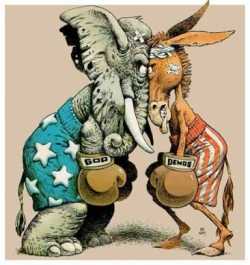
|
| Boxing Politicians |
This was more or less the system which the founding fathers, James Madison chief among them, envisioned for this shining city on a hill. And which two centuries of rather clever schemers have gradually eroded. The highly desirable feature of a republic is that the elected person is free to represent his own interpretation of what is best for his district or, failing that, what is best for the nation. The elected representative is encouraged to risk defeat in the next election, if in his judgment what is good for the district is bad for the nation. But he is not a suicide bomber if his vote will make little difference in the outcome he can be forgiven for taking cover. One would wish that fewer of them would speak one way and vote in the opposite direction, but that can be forgiven if someone back home in the district is keeping score and letting others know of it. The fundamental principle of a republic as distinguished from a pure democracy is that a representative, while free to act during his term in office, remains obliged to face the voters at the appointed time. Our system has come to exaggerate the actual extent of freedom to use judgment because the freedom has been stolen by party leaders through the application of schemes too devious to detail. But freedom is fundamentally a good thing. What has come to be so lacking is the idea of facing an informed electorate in making a choice between you and an informed opponent. The public, it must be feared, doesn't know beans.
And so the proposal for fixing this mess is difficult, but it can be stated simply. The recent economic boom created nearly a thousand billionaires; maybe four hundred would be a number that would escape challenge. If only fifty of them would endow think tanks in all fifty state capitals, and the fifty-first would endow an organization dedicated to making their research available to the public, then perhaps another fifty would be prompted to create a second think tank in each state capital on the opposite political side. Two polarized think tanks in each state capital, just imagine it. As things now stand, it would be a sufficient first step if that happened in only one state, and the rest of the country could watch what happens.
Relocation

|
| Moving Truck |
For many decades, at least since the Second World War, the Northeastern part of the country has been losing population. And business, and wealth. In recent years, New Jersey has been the state with the greatest net loss, and the Governor who is making the greatest fuss about it. Statisticians have raised this observation to the level of proven fact, although lots of people are even moving into New Jersey at the same time. This is a net figure, and it remains debatable what sort of person you would want to gain, hate to lose; so it's hard for politicians to be certain whether New Jersey's demographic shifts are currently a good thing or a bad thing.
Take the prison population, for example. Most people in New Jersey would think it was a good thing if the felons all moved to some other state because it would imply less crime and law enforcement costs. But one of the major recent causes of a decline in violent crime seems to be the universal presence of a portable telephone in everyone's pocket. Just let someone yell, "Stick 'em up!" loud enough, and thirty cell phones are apt to emerge, all dialing 911. On the other hand, cell phones are the universal communication vehicle for sales of illicit drugs and other illegal recreations, and the increase in automobile accidents is a serious business for inattentive drivers. Add to this confusion the data that capital punishment is more expensive for the State than incarceration is, and you start to see the near futility of knowing what is best to have more, or less, of.
What the Governor and his Department of Treasury mostly want to know is whether certain taxes end up producing a good net revenue for the State. That is, whether more revenue is produced by raising certain taxes more than others, or whether some taxes are a big component of the Laffer Curve, causing revenue to be lost by driving business, or business owners, out of state, in spite of the immediate revenue gain. The studies which have been done are fairly conclusive that executives tend to be most outraged by property taxes, since they have a hidden effect on the sale price of the house, and the amount of money available for school improvements. At least at present levels, a Governor is better off taking abuse for raising income or sales taxes, even though the apparent tax revenue might be the same as a rise in property taxes. Since property taxes are mostly set by a local municipal government, while sales and income taxes are usually set by state governments, a decision to raise one sort of tax or another can have unexpected consequences, or require obscure manipulations to accomplish.
Some politicians who believe their voting strength does not lie in the middle class, would normally want to hold up property values, not taxes because the data show that higher home prices drive away from the middle class and in certain circumstances are positively attractive to wealthy ones. Higher prices appeal to home sellers, at least up to a point. Wealthier people who are buying houses are likely to have an old one to sell; that's less true of first-time home buyers or people presently renting. Certain issues can even be reduced to rough formulas: a 1% increase in income tax would cause a 1% loss of population, but a 5% loss of people earning more than $125,000. A $10,000 increase in average home prices, on the other hand, causes a net loss of population, but mostly those with lower income. One important feature of tinkering with average home prices and property taxes is that these effects are "durable" -- they do not fade away over time.
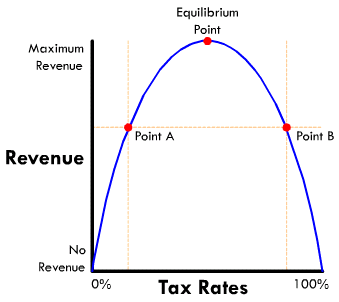
|
| Laffer Curve |
New Jersey is financially a bad state to die in, but the decision to move to Delaware, Florida or Texas is often made over a long period of years in advance of actually doing it. It has been hard to compile statistics relating changes in inheritance tax law to net migration of retirees and to present such dry data in an effective manner to counteract the grumblings that rich people are undeserving of tax relief, or dead people are unable to complain. But rich old folks are very likely to own or control businesses, and if you drive them out of state, you may drive away a considerably larger amount of taxation relating to the business in other ways. This is the underlying complaint of Unions about Jobs, Jobs, Jobs; but state revenue also relates to sales taxes of the business, business taxes, employee taxes, real estate taxes on the business property, etc, etc. Sometimes these effects are more noticeable in the region they affect; the huge population growth of the Lehigh Valley in recent years is mainly composed of former New Jersey suburbanites, who formerly earned their income in New York. The taxes of three different states interact, in places like that.
The audience of a group I recently attended contained a great many people who make a living trying to persuade businesses to move into one of the three Quaker states of the Delaware Valley. The side-bar badinage of these people tended to agree that many of the decisions to relocate a business are based on seemingly capricious thinking. The decision to consider relocation to the Delaware Valley is often prompted by such things as the wife of an executive having gone to school on the Main Line. Following that, the professional persuaders move in with data about tax rates, average home prices, and the ranking of local school quality by analysts. Having compiled a short list of places to consider by this process, it all seemingly comes back to the same capriciousness. The wife of the C.E.O. had a roommate at college who still lives in the area. And she says the Philadelphia Flower Show is the best there is. So, fourteen thousand employees soon get a letter, telling them we are going to move.
And, the poor Governor is left out of the real decision-making entirely, except to the degree he recognizes that home property taxes have the largest provable effect on personal relocation. And lowering the corporate income tax has the biggest demonstrable effect on moving businesses. But the largest un-provable effect is dependent on the comparative level of the state's inheritance tax.
Hedge Funds in Delaware

|
| Trimming the Hedge |
Some day a shrewd observer of the passing scene will notice the peculiar quality which attracts some businesses to the state of Delaware and coin a catchy phrase like Delaware Attractiveness to describe it in a nutshell. It surely underlies the way major national corporations predominantly incorporate under the laws of Delaware; other states don't like that. It probably accounts for the unusual accumulation of national credit card companies in that little state. Right now, it must be surmised to account for 24% of American hedge funds locating in Delaware. Just what is Delaware Attractiveness?
James Madison, the main author of our national Constitution, disliked taxes and debt and celebrated the ability of taxpayers to move to a different state if their home state raised taxes too high. The right to migrate away acts a discipline on state governments tempted to abuse power. A good example now exists in New Jersey, where one percent of the population pays 42% of the taxes, and that one percent is moving out of New Jersey as fast as it can. Eventually, that same 42% of taxes will be redistributed to those who remain, and something will be done about New Jersey state expenditures.
So conversely, little Delaware once had few corporations and little to lose by lowering corporate taxes. Soon, these low taxes attracted corporations from other states to incorporate in Delaware. When credit cards were invented, they were attracted to Delaware by low taxes, gentle regulation, and fair-minded courts. They were non-polluting businesses who employed a lot of rural labor made available by enhancements in agricultural productivity. One member of the Delaware Chamber of Commerce once mused, if it would attract the right sort of business, any hampering state legislation could be changed over a weekend.
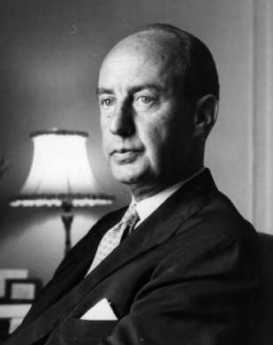
|
| Adlai Stevenson |
This spirit of the American Liechtenstein attracted 24% of hedge funds to Delaware before most people knew what a hedge fund is. Without delving into the full complexity of the subject, a hedge fund addresses the instability of investing for the long term with short term money. Promising higher returns than mutual funds which can generally be liquidated overnight, a hedge fund locks the investor's money up for several years and hence needs to tell its competitors (and unfortunately also the investor) comparatively little about what it is doing with his money. One hedge fund operator stoutly defended the need to keep others from knowing his positions, illustrating how competitors who knew his positions would destroy him by "front-running", typically by flooding his positions with sell orders about ten minutes before or after the closing bell on the stock market. And, indeed that was a realistic concern since 70% of current stock trading is performed by unattended computers, who can transact huge sales in seconds when they detect unusual patterns of activity. So, when the stock market crashed in 2007-2009, Congressmen were pressured to find scapegoats. Some blamed computerized trading, and some blamed hedge funds. Quite possibly, it was neither one, since hedge funds were comparatively unaffected by the crash, and "programmed" traders made a great deal of money. However, Delaware is discovering that anyone who visibly escapes a nation-wide panic is under suspicion of causing it, and must fight off hostile legislation at least until the full facts emerge. The ability to front-run, and the ability to avoid having it happen to you, constitute a business advantage, an "edge". There may be more to it than that, but other features are cloaked in the secrecy which hedge funds enjoy, so secrecy is the business plan of hedge funds, apparently more tolerantly treated in Delaware than elsewhere. The price which hedge funds pay for their right to secrecy is the limitation imposed on them by the regulators as to who may be their customers. Therefore, an acceptable hedge-fund customer gets defined as a rich sophisticated person, who knows what risks are involved, and can afford to lose his money. Being in a small, closely-knit community where word of mouth is trusted, adds some degree of safety too. Adlai Stevenson once made an observation about trusting such protections:
In the past it was said, a fool and his money are soon parted. But nowadays -- it could happen to anyone.
Go to Delaware, Elephants?
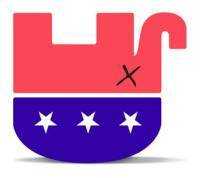
|
| Dead Elephant |
No one is supposed to know where elephants go to die, but if they are smart as people say they are, my suggestion is to search for dead elephants in the state of Delaware. Most taxes, and estate taxes, in particular, are considerably lower, there. At least this was the message Christopher J. Topolewski, Esq. conveyed to the Right Angle Club recently. His firm, West Capital Management, has prepared a table comparing the taxes in the three states that come together at the southeast corner of Pennsylvania, which for residents of the Philadelphia area are within easy commuting distance of each other. Although Delaware has a marriage penalty (one couple is taxed more than the sum of two singles), it has no estate tax at all, no sales tax, and a property tax rate only half that of Pennsylvania, only a quarter of that in New Jersey. For residents of New Jersey, there is almost no tax which is not lower in Delaware, because but ex-Pennsylvanians would then have to be careful to die or cohabit since ordinary income tax and capital gains taxes are higher in Delaware than Pennsylvania. If you must die (and who doesn't?), go die in Delaware.
This was a situation specifically contemplated as a way to discipline greedy state governments, by James Madison when he was formulating the U. S. Constitution. And there is evidence it is working. By happenstance, I once encountered an official of New Jersey taxation, who told me that 43% of New Jersey taxes are paid by 1% of the population. And that 1% was moving out of the state as fast as it could. If it does, the other 99% of New Jersey residents will find their taxes rising by 43%. West Capital reports that taxation as a percent of income is 1.23% in Delaware, 3.46% in Pennsylvania, and 5.82% in New Jersey, suggesting that a selective flight of the 1% would raise the state taxes of everyone else by 43%, and thus make state taxation as a percent of lowered average income rise to roughly 20%. Relating total income to total tax revenues would be an even better way to detect hidden indirect taxes, such as overtaxing utilities in the knowledge it will be passed on to the consumer. I recently discovered that a few years ago, the Legislature got tired of hearing complaints about local taxes, so they transferred half of the local taxes to the state tax. That's pretty much like taking it from one pocket and putting it into another because now all the hubbub is about state taxes. Armed with even partial information, it becomes easier to understand why New Jersey would evict a governor who had been Co-chairman of Goldman Sachs, during a financial crisis. If a financial whiz can't change this, maybe it requires a meat ax.
This is a time of growing restlessness about public spending, and Tea Party revolts are likely to accelerate during the remaining nine months before the next election. The conjecture is growing about a coming deadlock between a Republican Congress and a Democratic President, lasting at least two more years. What might emerge from a strong third party congressional delegation is too arcane to discuss. But at least the Republicans who leave can console themselves they are selectively raising the taxes of Democrats.
It seems almost inconceivable that professional politicians would demonstrate such a forest of tin ears as to let this happen, but the rest of Mr. Topolewski's talk just heated up the fire. His long-scheduled talk was designed to give guidance about the new estate tax laws, but he found himself confounding his audience with the news that there are no new estate tax laws; in fact, there will be no estate tax laws at all after this year unless they emerge from the congressional gridlock we already have. Which apparently will be followed by a gridlock we can scarcely imagine. Imagine asking your lawyer to write a will which straddles the contingencies that there will be no law, that there might be a continuation of the present one, or there might be some new law of quite uncertain wording. One of the suggestions offered is to allow your executor the discretion to accept or disclaim certain hypothetical provisions.
And that brings up an old story. William Penn was the largest private landowner in the history of America, possibly the whole world. He had a trusted agent, who gave him an enormous pile of papers to sign. A busy rich man like Penn is regularly confronted with a discouragingly large number of routine legal documents to sign. So, Penn signed them all, not noticing that one of the various papers in the pile gave the entire state of Pennsylvania -- to his agent. The outcome of the ensuing uproar was that Penn spent six years in debtors prison.
Implicit Powers of the Federal Government
<The two highest achievements of James Madison, had been and still remain, the writing of the Bill of Rights, and acting as a close collaborator with George Washington in fleshing out the role of the President in the new government. The Ninth and Tenth Amendments made it clear that the federal government was to be constrained to a limited and enumerated set of powers, while all other activities belonged to the states. This was already clear enough in the main text of the Constitution, which Madison also dominated after close consultation with Washington before the Constitutional Convention. So he had battled and successfully negotiated one matter twice, before the most powerful and distinguished assemblies in the nation. As to the second matter, circumstances had promoted a shy young bookworm into the role of preceptor to the most famous man in America. In the earliest days of the new republic, certainly during the first year of it, Washington and Madison worked closely together in defining the role of the Presidency.
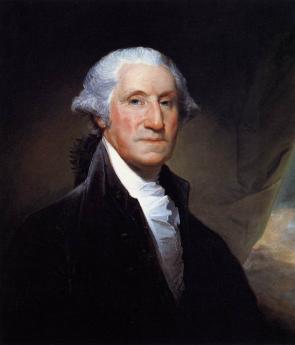
|
| George Washington |
During the first weeks of that exploratory period, Washington induced Congress to create a cabinet and the first four cabinet positions, even though the Constitution did not mention cabinets. It all was explained as an "implicit power", inherently necessary for the functioning of the Executive branch. Soon afterward, Alexander Hamilton as Secretary of the Treasury proposed the creation of a national bank. Madison and his lifelong friend Thomas Jefferson were bitterly opposed, using the argument that creating banks was not one of the enumerated powers granted by the Constitution. Hamilton's reply was that creating a bank was an "implicit power" since it was necessary for running the federal government. Of course, Hamilton and Jefferson both had other unspoken motives for their position: for and against promoting urban vs. rural power, for and against the industrialization of the national economy, and dominating the states in matters of currency and financial leadership. It empowered a national rather than a confederated economy.
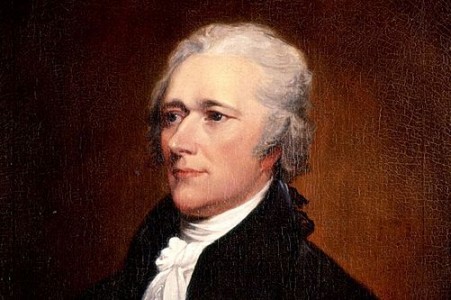
|
| Alexander Hamilton |
For Madison, the legalism probably carried considerably more weight than it did for Jefferson and Hamilton because it demonstrated the enduring consequences of being vague about the boundaries of any constitutional restriction. If this loophole got firmly established, it might reduce the whole federal system to a laughingstock. In order to promote the "general welfare", anything at all could be called an implicit power, and both separation of powers and enumerating federal powers would soon become quaint flourishes. The whole Constitution might fall apart in endless debates. On a personal level, Madison's highest achievements would have to be supplanted by something more practical. Besides which, Madison was a Virginian, a rich slave-holding farmer, and a young politician, seemingly on the verge of a promising career which might easily lead to the presidency for himself. Hamilton his most visible opponent, was already proposing a tax on whiskey which would almost surely antagonize farmers to the west, and assuming the Revolutionary debts of the states was equally divisive.
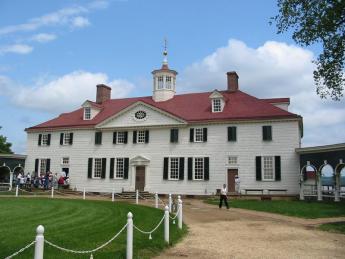
|
| Mt. Vernon |
As matters eventually worked out, the main disputants made ostensible constitutional arguments, while the real political dispute would be settled by a political deal struck at a dinner. It traded relocation of the national capital to Virginia, for the assumption of the debts of all states (when Virginia had already paid off its debt.) Location of the capitol opposite George Washington's home at Mt. Vernon also took care of difficulties coming from that direction. By the time the uproar about this arrangement subsided, the precedent for settling the inherent conflict between enforcing Constitutional limitations versus enlarging their boundaries had been set. The most opportune time for stricter interpretation was fading while the most likely advocates of it were restrained by their own example. The negotiation was a little unseemly, and probably encouraged similar decisions to migrate to a less conflicted body, which eventually John Marshall would define as the U.S. Supreme Court.
Fees for Trial Lawyers, Section 1983 Variety

|
| Abuse |
We are indebted to Nicholas D'Alessandro, Jr.,Esq. for opening our eyes to the marvels of "1983 cases". That's lawyer slang for Section 1983, Chapter 21 (Civil Rights), Title 42 (The Public Health and Welfare) of the United States Code. In effect, we are talking about a Reconstruction-era law passed in 1871, to protect ex-slaves from persecution by local Southern governments, "acting under color of law". During the entire first century after its enactment, about 270 lawsuits had been brought under this seemingly unobjectionable law.
Well, last year alone there were over 30,000 cases. The number has been steadily growing in the past twenty years, even though it is commonly believed Reconstruction is a best-forgotten episode in a tragic era of the past. Without significant objection, it is generally accepted that the main stimulus for 1983 cases is the recent (and extraordinary) feature of awarding full compensation for legal costs of the plaintiff. In other nuisance lawsuits, the contingent-fee system awards the lawyer a percentage (usually 33%) of the damages, making it unattractive to pursue minor cases. In a 1983 case, however, a trial lawyer could bill $350 an hour for many hours, while pursuing a case worth $100 in damages. A large proportion of these cases allege a local police officer deprived a citizen of his civil rights in the course of arresting him for a traffic violation.
Taken in the aggregate, awarding billions of dollars in fines against local governments can be imagined to represent a punishment of local taxpayers for not reigning in their police officers. They represent a signal from the federal government that it believes local law enforcement is too vigorous in the pursuit of minor infractions and creates an incentive to be less so. Alumni of the Vietnam War protests and other civil disobedience are probably sympathetic if they ever find themselves on juries in such cases.
In recent years, a growing source of 1983 cases have been related to local zoning laws and regulation. Many citizens claim they have been stripped of their property rights when forbidden to put a filling station in their front yard. Others darkly suspect local officials of taking secret bribes to re-sell the property to Wal-Mart, whenever government confronts the owner with taking his property by right of eminent domain. In cases like this, the sympathetic jurors are likely to be Jeffersonians, with a hunting rifle hanging above their fireplace. Such fiercely independent people, however, are given pause by knowing they must appeal the action of local officials to the federal government, acting under a federal law called Section 1983. The frustration must be intensified by learning the U.S. Supreme Court has declared it will not second-guess a local government by granting a writ of certiorari unless the action "offends our conscience". A careful search of the records of the Third Federal District (our own) fails to discover a single instance when that conscience was offended enough to intervene.
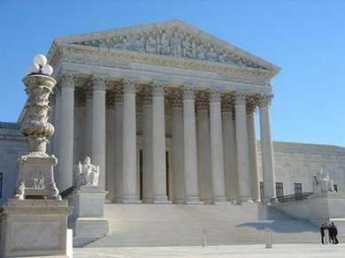
|
| Supreme Court |
But, wait. In 2005, the public flamed up. In keeping with past tradition, the Supreme Court again found its conscience was not offended by the exercise of eminent domain by the City of New London, Connecticut. New London is experiencing hard times, potentially made worse by the threatened closure of the nearby submarine base. Accordingly, it seemed in the public interest to condemn some small private properties in order to assemble a large parcel of land for commercial development. Libertarian groups took up the case of Ms. Kelo, a dispossessed small landholder, and carried it to the U. S. Supreme Court, who declared that the eminent domain didn't bother them.
But Kelo v. City of New London did bother a lot of citizens all over the country. Even making allowance for the hostility to the eminent domain which has been growing for decades, and recognizing it is being stirred up by ideological groups, the Supreme Court still had crossed some sort of invisible line. What New London does with its waterfront is of small concern to the rest of the nation, but for the Supreme Court to declare it doesn't really care about such trifles is quite another matter. A man's home has always been referred to as his castle in this country, and title to a great many properties is only completely clear if you acknowledge the power of that gun on the mantelpiece. Add to that the recent extraordinary rise in real estate prices, and you might expect small property holders to be highly resistant to state takings. One must be sympathetic with the dilemma of the judiciary in trying to balance such intense attitudes with the general welfare of the community, particularly a community with floundering economics. But a Supreme Court that can't be bothered with trifles, that don't worry unless you light a fire under them -- had better expect to get fires lit under them.
John Marshall Decides Three Cases
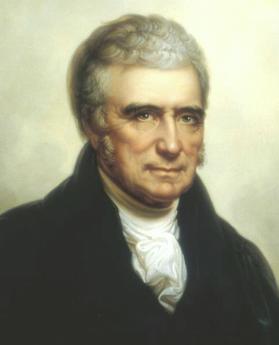
|
| Chief Justice John Marshall |
John Marshall, taking sixteen years to do it, transformed the Constitution internally into the cornerstone of the Rule of Law, making the legal profession its guardian. Nine respected justices now essentially hold lifetime appointments as bodyguards of the structure Marshall designed, with all lawyers acting as lesser officers. Nevertheless, four personal things are important to remember. Marshall had been a Revolutionary soldier, he wrote a five-volume biography of George Washington, he positively hated his first cousin Thomas Jefferson. And his thirty-five-year tenure as the third Chief Justice of the U.S. Supreme Court coincided with some of the dirtiest national politics the nation has ever seen. Marshall's enthronement of Chief Justice control of the federal courts was tolerated because it promoted them both to national power. And when this tough politician had earned the loyalty of both the court system and the legal profession to himself, he transformed the image of the Constitution from a contract between the states into an American Bible for the Rule of Law. Incidentally, he could beat anyone at horseshoes, a game requiring a winner to be both strong and precise. Much of his achievement grows out of three pivotal Supreme Court cases, which today might just as well be regarded as amendments to the Constitution.
 In all Cases affecting Ambassadors, other public Ministers and Consuls, and those in which a State shall be Party, the Supreme Court shall have original Jurisdiction. In all the other Cases before mentioned, the Supreme Court shall have appellate Jurisdiction 
|
| Article 3, Section 2.3 |
Marbury v Madison (1803). The first of Marshall's three cornerstone cases involved the Chief Justice himself. After being defeated for reelection to the Presidency in 1800 by Thomas Jefferson, President John Adams hastened to fill up remaining judicial vacancies before Jefferson his successor could be inaugurated, in a maneuver described as "appointing midnight judges". In a sense, Marshall's appointment as Chief Justice had also been in anticipation of the coming eviction of Federalist office holders, so he was himself more or less a midnight judge, destined to become by many years the last Federalist to survive in office. In any event, he was Adams' Secretary of State, soon to be replaced by James Madison, who would then assume the duty to deliver judicial appointment papers to new judges. Marshall was an impassioned Federalist, bitter about the defeat of his party, nursing personal hatred for Jefferson after years of family differences. To say he had a conflict of interest is not only to brush hurriedly by the issue but also to dramatize what loose judicial standards prevailed at the beginning of his three-decade tenure as Chief Justice.
Appointment papers for the midnight judges were completed and lying on the desk of the Secretary of State when the Presidency changed hands from Adams to Jefferson. Had he known what was coming, Secretary of State Marshall would surely have hastened to deliver the papers, but he had not done so. His successor as Secretary of State, James Madison, on the orders from Jefferson, refused to do it, so Marbury sued for a writ of mandamus, or order from a court to deliver the documents. By this time, Marshall was in a new role of presiding over the Supreme Court, fearful to attack Jefferson head on, but nevertheless eager to command the most humiliating obedience from him. Using the technicality (actually, the plain language of the Constitution) that the request was made to the wrong court, mandamus was rejected by Marshall. However, he went on to say in a judicial aside (obiter dictum) that if the right request had come to the U.S. Supreme Court properly , the Court would have approved it. Thus, in one dazzling maneuver at the beginning of his term, Marshall simultaneously asserted the Court's right to review Presidential and Legislative actions, reproved Jefferson for his ignorant conduct, and boxed him into submission by seemingly letting him win a minor case, but one he could be sure would soon have been followed by major ones if the President somehow evaded this decision. Furthermore, he dazzled the legal profession with this tap-dance, guaranteeing their applause by greatly enhancing the status of judges within the Republic, especially compared with the President. And, it should be mentioned, he suppressed public outcry by performing this set of actions in full public view, cloaked within incomprehensible legal garments. The public could see he had done something important, which only lawyers would completely understand. Marshall plainly began his term by demonstrating the full meaning of the rule of law, and his own position astride that law. The main point was that when ordinary judges include offhand commentary in a decision, it might be ignored. But when the Chief Justice of the United States speaking for the majority of his court, makes a legal observation, it would be a brave lawyer indeed who would bring an action in conflict with it. And as for the President and Legislature, Marbury v Madison had also just brushed them aside. It was all done properly, using civil language but deadly logic.
Martin v Hunter's Lessee (1816). This case might be a little more understandable if retitled as "The Heirs of Lord Fairfax v Fairfax County, Virginia". A Virginia law permitting the seizure of Tory property, written decades before the Constitution, asserted its precedence to Federal Law, and therefore its precedence over Federal Law. (To this day, Virginia never quite forgets it was once the largest, richest state, founded nearly two centuries before the Constitution.) Like Marbury v Madison, the case is clouded by Marshall's personal involvement since the Chief Justice had signed a contract with Martin to buy the land himself. This impairment to the case's claim to legal cornerstone status is not entirely annulled by Marshall recusing himself, turning authorship of the opinion over to his faithful disciple Justice Story. Furthermore, the judicial establishment of the principle that an international Treaty (in this case, the Jay Treaty) takes precedence over an Act of Congress is one the nation may still someday come to regret, if movements for "International human rights" and "universal international law" continue to gain popular traction. Such movements are numerous, including international law for the conduct of wars, and the universal Law of the Sea.
The United Nations might now be more of a force if they had not stumbled over the franchise of hundreds of nations, each given an equal vote. To expect the major nations of the Security Council to obey the single-vote mandates of dozens of small African nations is to agree in advance that the UN must be disregarded. Nevertheless, Martin v Hunter's Lessee did eliminate an escape route from Supreme Court domestic domination which might have proved troublesome in Civil War nullification disputes, or in legal cases for which national uniformity is important. On appeal, the Supreme Court finally declared its absolute supremacy over State courts as a general matter, clarifying a number of legal loose threads which had been keeping the precedence issue alive.
McCullough v Maryland 1819) The facts of this case seem considerably simpler than Marshall's long and thundering opinion of them. Indeed, the opinion sounds more like an oration on the meaning of the Constitution, or an enraged obiter dictum , than a terse opinion that the State of Maryland's legislature had passed an unconstitutional law. His remarks are indeed an exposition on the general thrust of the Constitution, foreshadowing many disputes leading up to the Civil War. In effect, it began to make it clear to the slave states that their states-rights viewpoints might conceivably be upheld on a battlefield, but never in a Courtroom. It is thus an opinion which every law student should read several times, and every citizen would profit from reading at least once. At Gettysburg Abraham Lincoln was to restate the principles in concise, even poetic, language. But long before that, Marshall had stood upon a legal mountain, declaiming them in thundering detail.
 The Congress shall have power---To make all Laws which shall be necessary and proper for carrying into Execution the foregoing Powers, and all other Powers vested by this Constitution in the Government of the United States, or in any Department or Officer thereof. 
|
| Article 1, Section 8, clause 18 |
The United States Congress had chartered the Second Bank of the United States in 1816, which then established a Baltimore branch in 1818. There was a national financial panic in 1818, which probably hastened local bank lobbyists to the Maryland Legislature, looking for relief from the unwanted federal competition. Maryland passed a law imposing a fairly high state tax on the operations of the new federal bank. McCullough, the cashier of the federal branch bank, refused to pay the tax. On appeal, McCullough maintained the tax was unconstitutional, and the U.S. Supreme Court upheld him, ordering the opinions of the Maryland courts to be reversed. John Marshall wrote the opinion and took the occasion to set forth his views on constitutionality. Point by point, my point.
What it meant, the old Federalist in a sense intoned, was the states had lost power at the Constitutional Convention and were not going to get it back. The founding fathers and George Washington, in particular, had been uneasy about accusations they had gone beyond their mandate in even calling the Philadelphia Convention. The Articles of Confederation had declared its own provisions to be "perpetual", and the states had previously bound themselves to that. True, the Confederation Congress had authorized a study of how to improve the Articles, but it had never gone so far as to suggest the Philadelphia Convention toss them out.
When the Philadelphia Convention was finishing up its work, Gouverneur Morris had written a preamble beginning with "We the People" in order to assert that its authorization came from the people and not from the governments directly confederated under the Articles, which was true. The ratification process was carefully steered into the language which asked for ratification by the people, acting by states, and from which elected state officers were excluded. The state ratification conventions heard considerable concern about legitimacy voiced by those who probably really disapproved of one feature or another. But overall it was more importantly true that the people at the ratification conventions gradually grew intrigued by the mechanics of self-rule and appreciative of the depth of thought they could see the founders had displayed. By the time the necessary number of states had ratified, public enthusiasm was genuine, while the opposition was squelched into silence or else indirection of speech. Legitimate opposition was acknowledged by specifying that ratification was conditional upon the adoption of a Bill of Rights. Finally, after the new government was subsequently tested by wars and near-wars, pratfalls and triumphs interspersed, the opposition was not only widely judged to have had its say, but its own chance to stumble. After nearly three decades of this, Marshall seems to have decided it was time to lay down the law. All of that is behind us, he said in effect state governments have knuckled under, and the Constitution is indeed triumphant. It was time to snuff out the grumbling and the scheming, and to declare invalid any future attempts at evasion.
The constitutional compromise had confined federal power to a few defined activities and whatever else was proper and necessary within those powers. It did not limit Congress to "absolutely" necessary and "absolutely" proper actions which might heedlessly confine such limited powers to awkward and inefficient behavior. Rather, the Constitution identified areas of power where the two types of government were best suited, expecting them to do their best without hampering each other with turf battles. If Congress decided that banks, or chartered corporations, were desirable means of promoting commerce which had been left unspecified in the Constitution, states could not for that reason alone interfere with federal use of them. States could charter any corporations and banks they pleased, and the federal government could do the same, but only if necessary and proper. There were many other features left unspecified, proper enough for the states to do, but which the federal government might also do -- when necessary and proper to implement its enumerated powers. It was, in short, improper for states to interfere with what was desirable for the national government to do unless the Constitution prohibited it. And the U.S. Supreme Court would be there to decide close cases.
In particular, the states were not to undermine the federal government in the legitimate pursuit of its enumerated powers. Of the strategies available, taxation was particularly vexing, since the difference between a fair tax and a burdensome one can be a matter of opinion. Ultimately, the power to tax is the power to destroy, and it would be better not to have the states taxing the national government in its operations, like issuing currency. The exception might be made for traditional state activities like taxing the bank's real estate. But if the states can tax currency operations, they can set any price, taxing anything if they set about to undermine legitimate Federal activities; such hampering was not contemplated at the Philadelphia Convention, and it will not be tolerated by the courts. Legislatures whose sovereignty ends at their state borders have no right to tax the entire nation which extends beyond those borders. And since state courts must follow state interests and state constitutions, their rulings are subordinate to those of the federal courts, as well.
With the one possible exception of international treaties, all government entities which might challenge the Supreme Court had by now had their noses rubbed in subordination to it. John Marshall went a step further. He even invented a new way to fashion laws which no one at all could challenge: as long as he spoke for the majority, the asides and comments of the Chief Justice in his obiter dicta had become a sort of supreme law.
Fisher on TV

|
| Governor Chris Christie |
As I was rushing out of my office tonight, trying not to be late for a gathering of constituents, I was suddenly confronted by a nice young lady holding a piece of paper, closely followed by a young man with a big professional TV camera. I like to think they were lying in wait for me, but more likely they were haunting the Starbucks across the street.
The question was fired at me, what did I think about Governor Christie using the Supreme Court about gay marriage? I had to admit I don't watch TV all day long, so I hadn't heard about it. Well, do you think it is appropriate for the Governor of a state to sue the Supreme Court? Huh, do you? Caught totally by surprise by a question I don't know much about, I answered, or mumbled, that it seemed to be a lawyer's question, and I'm not a lawyer. I do know that the U.S. Supreme Court will refuse to take a case unless the plaintiff can show he has sustained a personal loss of some sort. But I don't know anything about the New Jersey Supreme Court or its rules, and the whole thing seems to me to be above my pay grade. Or something like that.
If I had had more than ten seconds to think about it, I might have said, "What you really are asking me is Don't you think Christie is a bad, insensitive person?" And my answer to that question if put a little more plainly, would be, "No, I like Governor Christie a lot and I trust a former U.S. Attorney to know the fine points of law better than I do, so I support him."
And if I am wrong, and the real question you are asking me is Am I gay? Then, my answer would be, "No, I'm not gay one bit. But I am inclined to let other people do as they please, as long as it is harmless to others."
And if the hidden question is do I approve of people being gay, I would have to answer that if everybody became gay, it's pretty hard to see how the human race would survive. Now could I ask you a question? Who are you, and who is paying you to ask me slanted questions?
Follow-up, written the next day: The next day's newspaper gave an entirely new slant to this little episode. It seems the decision was made by the Superior Court, not the Supreme Court, and Governor Christie appealed the decision, he did not sue anybody. So the whole interview process was a put-up job, slanting the attention away from a record-breaking court decision to Governor Christie, who was dutifully responding to a Superior Court ruling which overturned a state law. All the rest of it was either intended to shift attention or else to tangle me up in a confused reaction to some events which did not happen at all.
In that case, let me state my central position. Governor Christie is a great guy, who definitely needs to win re-election November 5. And I am running for the role of Assemblyman for the 6th District, prepared to help him in every way I can.
Jury Nullification
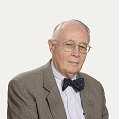 |
| Tom Monteverde |
We must be grateful to the late distinguished litigator, Tom Monteverde, for reminding us of the importance of the jury in American history. Juries seldom realize how much power they can have if they unite on a common purpose. In fact, juries have the implicit right to veto almost anything the rest of government does, by rendering it unenforceable. If the jury opinion is a majority view, nothing but a civil war can legally stop them. So it helped Washington to have jury nullification seem an invincible Quaker idea, while the South trusted a rich slave-owner who had renounced power.
 |
| William Penn |
The right to a jury trial originated in the Magna Carta in 1215, but a jury's essentially unlimited power was established four centuries later by Quakers. The legal revolution grew out of the 1670 Hay-market case, where the defendant was William Penn, himself. Penn was accused of the awesome crime of preaching Quakerism to an unlawful assembly, and while he freely admitted his guilt he challenged the righteousness of such a law. The jury refused to convict him. The judge thus faced a defendant who said he was guilty and a jury who said he wasn't. So, the exasperated judge responded -- by putting the jury in jail without food.
The juror Edward Bushell appealed to the Court of Common Pleas, where the problem took on a new dimension. The Justices certainly didn't want juries flouting the law, but nevertheless couldn't condone a jury being punished for its verdict. Chief Justice Vaughn decided that intimidating a jury was worse than extending its powers, so the verdict of Not Guilty was upheld, and Penn was set free. Essentially, Vaughn agreed that any jury that wasn't allowed to acquit was not really a jury. In this way, the legal principle of Jury Nullification of a Law was created. A verdict of not guilty couldn't make William Penn innocent, because he pleaded guilty. A verdict of not guilty, under these circumstances, meant the law had been rejected. Jury nullification thus got to be part of English Common Law, hence ultimately part of the American judicial system.
 |
| Andrew Hamilton |
This piece of common law was a pointed restatement of just who was entitled to make laws in a nation, whether or not nominally it was ruled by a king or a congress. Repeated British evasion of the principles of jury trial became an important reason the American colonists eventually went to war for independence, and probably a better one than some others. The 1735 trial of Peter Zenger was an instance where Andrew Hamilton, the original "Philadelphia Lawyer", convinced a jury that British law, blocking newspapers from criticizing public officials for improper conduct, was too outrageous to deserve enforcement in their court. In that case, jury defiance became even more likely when the judge instructed the annoyed jury that "the truth is no defense". Benjamin Franklin's Pennsylvania Gazette was here quick to come to the side of jury nullification, saying, "If it is not the law, it ought to be law, and will always be law wherever justice prevails." Franklin quickly became allied with Andrew Hamilton, who became Speaker of the Pennsylvania Assembly.
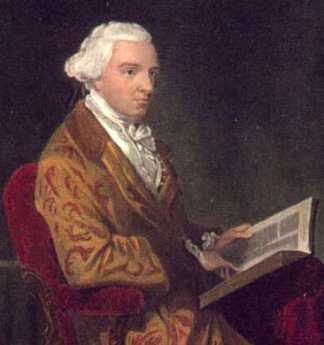 |
| John Hancock |
The Zenger case was often stated to be the origin of the Freedom of the Press in our Constitution fifty years later, but in fact the First Amendment merely provides that Congress shall pass no laws like that. Hamilton had persuaded the Zenger jury they already had the power to stop enforcement of such tyranny, and the First Amendment could be seen as trying to prevent enactment of laws that will foreseeably incite a jury to revolt.
The Navigation Acts of the British government, for example, were predictably offensive to the American colonists, whose randomly chosen representatives on juries were then rendered useless with their wide-spread refusal to convict. This, in turn, provoked the British ministry. John Adams made a particularly famous defense of John Hancock who was being punished with confiscation of his ship and a fine of triple the cargo's value. Adams was later singled out as the only named American rebel the British refused to exempt from hanging if they caught him. As everyone knows, Hancock was the first to step up and sign the Declaration of Independence, because by 1776 there was widespread colonial outrage over the British strategy of transferring cases to the (non-jury) Admiralty Court. Many colonists who privately regarded Hancock as a smuggler were roused to rebellion by the British government thus denying a defendant his right to a jury trial, especially by a jury almost certain not to convict him. To taxation without representation was added the obscenity of enforcement without due process. John Jay, the first Chief Justice of the Supreme Court of the newly created United States, ruled in 1794 that "The Jury has the right to determine the law as well as the facts." And Thomas Jefferson built a whole political party on the right of common people to overturn their government, somewhat softening, it is true, when he grasped where the French Revolution was heading. Jury Nullification then lay fairly dormant for fifty years. But since the founding of the Republic and the reputation of many of the most prominent founders was based on it, there was scarcely need for any emphasis.
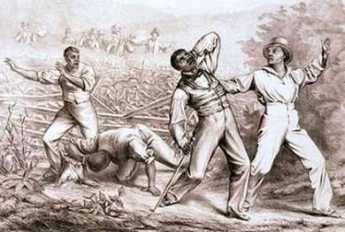 |
| Slave |
And then, the Fugitive Slave Law of 1850 began to sink in. It became evident that juries in the Northern states would routinely refuse to convict anyone under that law, or under the Dred Scott decision, or any other similar mandate of any branch of government. In effect, Northern juries threw down the gauntlet that if you wanted to preserve the right of trial by jury, you had better stop prosecuting those who flouted the Fugitive Slave law. In even broader terms, if you want to preserve a national government, you had better be cautious about strong-arming any impassioned local consensus. A rough translation of that in detail was that no filibuster, no log-rolling, no compromises, no oratory, no threats or other maneuvers in Congress were going to compel Northern juries to enforce slavery within their boundaries of control. All statutes lose some of their majesties when the congressional voting process is intensely examined, and public scrutiny of this law's passage had been particularly searching. Even if Southern congressmen would be successful in passing such laws, it wasn't going to have any effect around here. The leaders of Southern states quickly got a related message, and their own translation of it was, "We have got to declare our independence from this system of government that won't enforce its own laws". If juries can nullify, then states can nullify, and the national union was coming to an end. Both sides disagreed so strongly on this one issue they were willing, for the second time, to risk war for it.
Ku Klux Klan
The idea should be resisted that Jury Nullification is always a good thing. After the Civil War, many of the activities of the Ku Klux Klan were tolerated by sympathetic juries. Many lynch mobs of the Wild, Wild West were encouraged in the name of law and order. Prohibition of alcohol by the Volstead Act was imposed on one part of society by another, and Jury Nullification effectively endorsed rum-running, racketeering, and organized crime. The use of marijuana and abortion are two further examples where disagreement is so strong that compromise eludes us. What is at stake here is protecting the rights of a minority, within a society run by a majority. If minority belief is strong enough, jury nullification issues an unmistakable proclamation: "To proceed farther, means War."
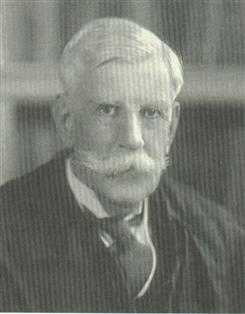 |
| Oliver Wendell Holmes |
That's a somewhat strange outcome for a process started by pacifist Quakers, so the search goes on for a better idea. Distinguished jurists differ on whether to leave things as they are. In a famous exchange, Oliver Wendell Holmes once had dinner with Judge Learned Hand, who on parting extended a lawyer jocularity, "Do justice, Sir, do justice." To which, Holmes then made the somewhat surly response, "That is not my job. My job is to apply the law."
Thus lacking any better approach, it is hard to blame the US Supreme Court for deciding this was something best left unmentioned any more than absolutely necessary. The signal which Justice Harlan gave in the majority opinion on the 1895 Sparf case was the very narrow ruling that a case may not be appealed, solely on the basis that the trial jury was not informed of its right to nullify the law in question. Encouraged by this vague hint, what has evolved has been a growing requirement that incoming jurors take an oath "to uphold the law", officers of the court (ie lawyers)are discouraged from informing a jury of its true power to nullify laws, and Judges are required to inform the jury in their charge that they are to "take the law as the judge lays it down" (ie leave appeals to higher courts). If a jury feels so strongly that it then persists in spite of those restraints, well, you apparently can't stop them. Nobody thinks this is a perfect solution, and aggrieved defendants like the Vietnam War protesters are quite vocal in their belief that the U.S. Supreme Court finally emerged with a visibly asinine principle: a jury does indeed have the right to nullify, but only as long as that jury is unaware it has that right. That's almost an open invitation to perjury if accurate; but while it's not precisely accurate, it comes close to being substantially true.
That's where matters stand, and apparently will stand, until someone finds better arguments than those of Benjamin Franklin, John Jay, Andrew Hamilton -- and William Penn.
22 Blogs
John Rutledge and Judicial Powers
 History neglects the role of John Rutledge of South Carolina in shaping the Constitution, because of his defense of slavery. Nevertheless, he rose to the moment when left in charge of a committee, to fill in gaps important to judges and lawyers. No matter what else it is, the Constitution is the capstone of our legal system.
History neglects the role of John Rutledge of South Carolina in shaping the Constitution, because of his defense of slavery. Nevertheless, he rose to the moment when left in charge of a committee, to fill in gaps important to judges and lawyers. No matter what else it is, the Constitution is the capstone of our legal system.
.......................................Marshall
 The American court system changed considerably during its first fifty years; it is arguable that such changes should have been fixed to the Constitution. However, neither scholars nor radicals have persuaded the people that Constitutional changes are much needed. The nation seems to delegate the problem to the early lawyer designers, especially Ellsworth, Marshall, and Story.
The American court system changed considerably during its first fifty years; it is arguable that such changes should have been fixed to the Constitution. However, neither scholars nor radicals have persuaded the people that Constitutional changes are much needed. The nation seems to delegate the problem to the early lawyer designers, especially Ellsworth, Marshall, and Story.
Leadership and Priesthood

Marshall's Predecessor, Oliver Ellsworth
John Marshall's career sounds like a continuation of the life of Oliver Ellsworth, his predecessor. Together with Associate Justice Joseph Story, Marshall's evangelist, these three Justices transformed the American Court system.
Delaware's Court of Chancery
 Georgetown, Delaware is a pretty small town, but it's where the major corporations of the nation plead their case.
Georgetown, Delaware is a pretty small town, but it's where the major corporations of the nation plead their case.
Chief Justice John Marshall Enters (Kettledrums and Crashing Cymbals)
 John Marshall is known for some ground-breaking decisions, but many of his most influential pronouncements were just side comments with no force of precedent, obiter dicta , as they are called in legal circles. Marshall came to realize that if he told the legal profession what he firmly believed, no lawyer would think it was wise to conflict with the views held by the final level of appeal.
John Marshall is known for some ground-breaking decisions, but many of his most influential pronouncements were just side comments with no force of precedent, obiter dicta , as they are called in legal circles. Marshall came to realize that if he told the legal profession what he firmly believed, no lawyer would think it was wise to conflict with the views held by the final level of appeal.
Evolving Constitution
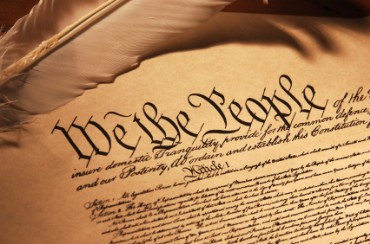 As soon as the 1787 Constitution was ratified, it started to be amended, and enabling statutes began to appear. Regulations are written by the Executive Branch eventually outnumbered the laws written by Congress, but they had the same force of law. Hundreds of Supreme Court decisions modified the original intent, ever so slightly. The direction of drift is often hard to recognize, but there are a few clues.
As soon as the 1787 Constitution was ratified, it started to be amended, and enabling statutes began to appear. Regulations are written by the Executive Branch eventually outnumbered the laws written by Congress, but they had the same force of law. Hundreds of Supreme Court decisions modified the original intent, ever so slightly. The direction of drift is often hard to recognize, but there are a few clues.
Constitutional Judicial Branch Clauses
New blog 2012-08-02 15:28:05 description
Reconsidering All Our Laws
 The legislatures of America were handed a clean slate for statutes by the 1787 Constitution, and thus given the opportunity to review the entirely legal system. It took nearly a century to accomplish and is still proceeding.
The legislatures of America were handed a clean slate for statutes by the 1787 Constitution, and thus given the opportunity to review the entirely legal system. It took nearly a century to accomplish and is still proceeding.
Owen Roberts: A Switch in Time
 His old law firm devotes a reception room in his name, but not everyone is pleased with his writing the documents establishing the Barnes Foundation, or his capitulation to Franklin Roosevelt's threat to pack the US Supreme Court.
His old law firm devotes a reception room in his name, but not everyone is pleased with his writing the documents establishing the Barnes Foundation, or his capitulation to Franklin Roosevelt's threat to pack the US Supreme Court.
Roberts the Second
 Chief Justice John Roberts seems to be intent on radical changes to the Supreme Court, made in a conservative way.
Chief Justice John Roberts seems to be intent on radical changes to the Supreme Court, made in a conservative way.
Dark Morning at the Supreme Court
 Shouldn't the Supreme Court televise its hearings?
Shouldn't the Supreme Court televise its hearings?
Regulation Precision: Not Entirely a Good Idea
Addressing the Flaws of Republics
Relocation
Hedge Funds in Delaware
Go to Delaware, Elephants?
Implicit Powers of the Federal Government
Fees for Trial Lawyers, Section 1983 Variety
John Marshall Decides Three Cases
Fisher on TV
Jury Nullification
 We need some local, not national, think tanks. To understand why, it helps to have been elected to something, yourself.
We need some local, not national, think tanks. To understand why, it helps to have been elected to something, yourself.
 Moving your place of residence has many influences, but property taxes seem to have the biggest influence on business executives decided to move. By contrast, property prices have the biggest influence on the middle class.
Moving your place of residence has many influences, but property taxes seem to have the biggest influence on business executives decided to move. By contrast, property prices have the biggest influence on the middle class.
 The state of Delaware attracts clusters of businesses for reasons having to do with its legal system; call it Delaware Attractiveness. At the moment, it attracts hedge funds.
The state of Delaware attracts clusters of businesses for reasons having to do with its legal system; call it Delaware Attractiveness. At the moment, it attracts hedge funds.
 It's about a 20-minute commute from Delaware to Philadelphia, with a big difference in estate taxes. Moving from New Jersey to Delaware would double that difference.
It's about a 20-minute commute from Delaware to Philadelphia, with a big difference in estate taxes. Moving from New Jersey to Delaware would double that difference.
 The Constitution strictly limited the number of federal powers, but did not define their boundaries. Intending to be flexible, it opened a permanent loophole.
The Constitution strictly limited the number of federal powers, but did not define their boundaries. Intending to be flexible, it opened a permanent loophole.
 Suing your own town is now getting so popular it clogs the courts.
Suing your own town is now getting so popular it clogs the courts.
 Marbury v Madison (1803), Martin v Hunter's Lessee (1816), and McCullough v Maryland (1819) -- these three cases were the ones where John Marshall changed judicial history. Taught in law school as case law, they are more accurately moments of national history.
Marbury v Madison (1803), Martin v Hunter's Lessee (1816), and McCullough v Maryland (1819) -- these three cases were the ones where John Marshall changed judicial history. Taught in law school as case law, they are more accurately moments of national history.
 They stop you on the street with a movie camera, these days.
They stop you on the street with a movie camera, these days.
 William Penn demonstrated one of the most incisive legal minds in England by trapping the British courts in what remains a central unresolved dilemma for the law. He was the defendant in his own case. By the South's way of looking at things, it was a pacifist effort to restrain mindless abolitionism. Meanwhile, both sides calculated it would win if the South decided to fight.
William Penn demonstrated one of the most incisive legal minds in England by trapping the British courts in what remains a central unresolved dilemma for the law. He was the defendant in his own case. By the South's way of looking at things, it was a pacifist effort to restrain mindless abolitionism. Meanwhile, both sides calculated it would win if the South decided to fight.